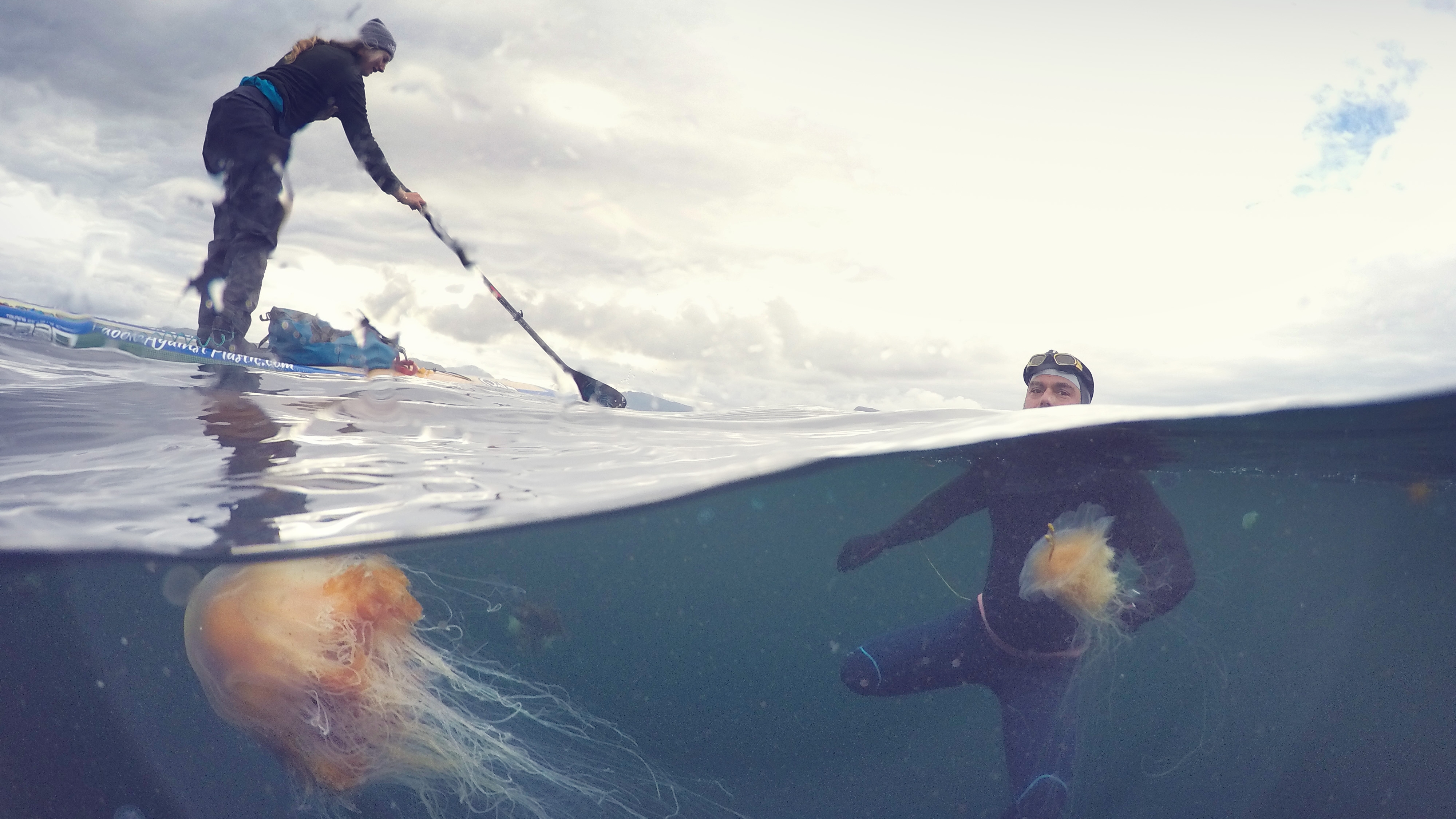The best hiking shoes: capable summit-baggers and fast-paced walkers
We've tested the best hiking shoes to see how they hold up in challenging conditions – including techy terrain, steep scrambles and boggy trails
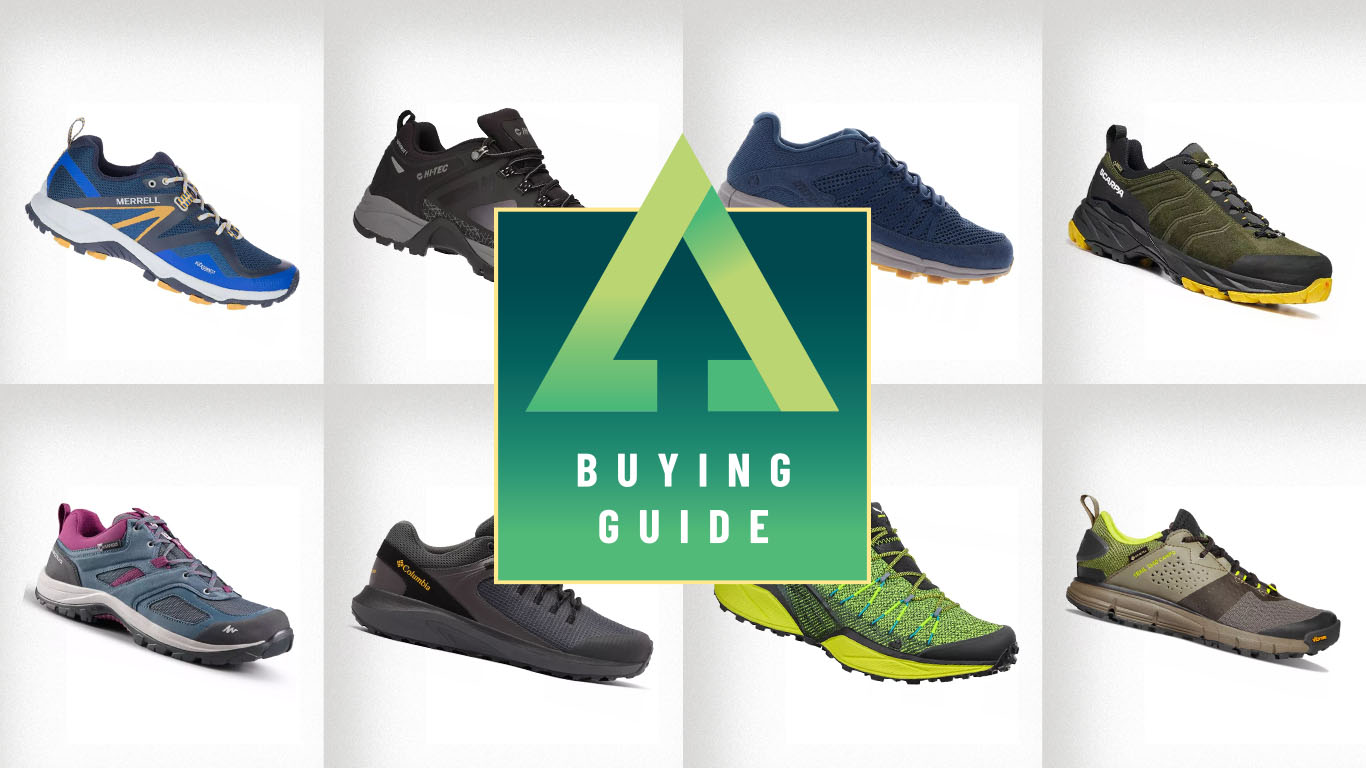
- Quick list
- Comparison table
- Best all terrain
- Best for day hikes
- Best waterproof
- Most comfortable
- Best for demanding terrain
- Best for speed on technical trails
- Best for muddy conditions
- Best for fastpacking
- Best sneaker-like shoe
- Best lightweight
- Best for trail feel
- Best for summer
- Best for stability
- Best value
- FAQs
- How to choose
The best hiking shoes are a great option if you're trekking in warmer climes, or simply want to feel lighter on your feet than when wearing a pair of the best hiking boots.
Lower cut footwear doesn't offer the same protection or warmth as a boot, but that doesn't make it a bad choice. Sometimes you just want a lighter shoe, or to enjoy the flexibility that comes when your ankles aren't encased in layers of padding.
Many of the best hiking shoes are stripped back versions of their hiking boot cousins, often with excellent features, such as breathable uppers, waterproof technologies and grippy rubber soles. Ankle protection is a totally personal choice, so don't be swayed by anyone who insists that you need a boot in the colder seasons.
Scroll down here to find hiking shoes adept at taking on all types of terrain, pairs perfect for speed-hiking missions, our pick of the best sustainable options, the most comfortable hiking shoes, great shoes for fastpacking and the best budget options.
Ultralight enthusiasts might want to check out the best lightweight hiking boots and shoes too, for hikers that combine ultralight materials with a fair bit of protection.
People with wide feet will find pairs with a roomier fit in our guide to the best hiking boots and shoes for wide feet, and those who are looking to spend less can find quality budget hiking boots that don't compromise comfort and durability.
The quick list
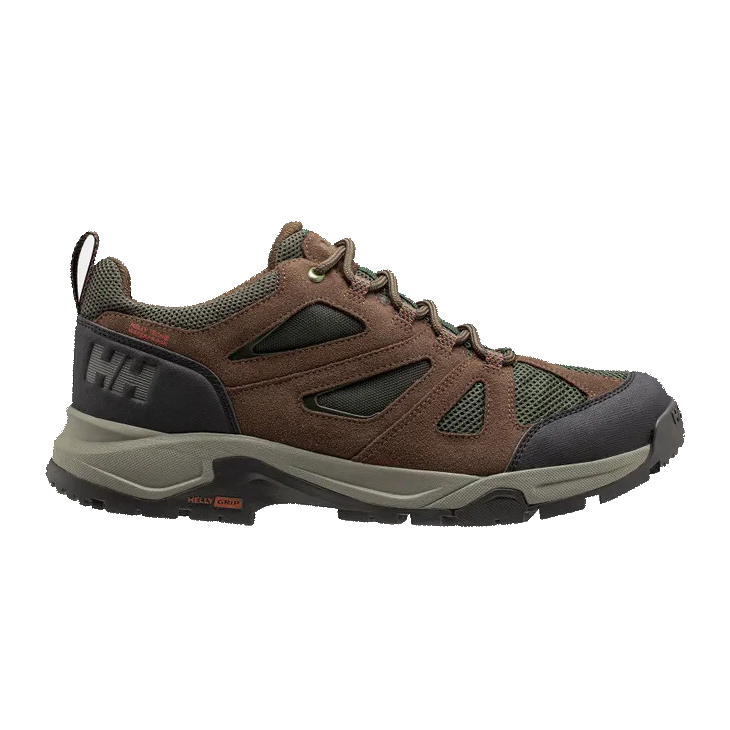
These are an excellent choice for hikers looking for a three-season walking shoe. We found them lightweight and nimble, but also rugged enough to tackle most types of terrain, with an outsole that gives great traction and control in most conditions
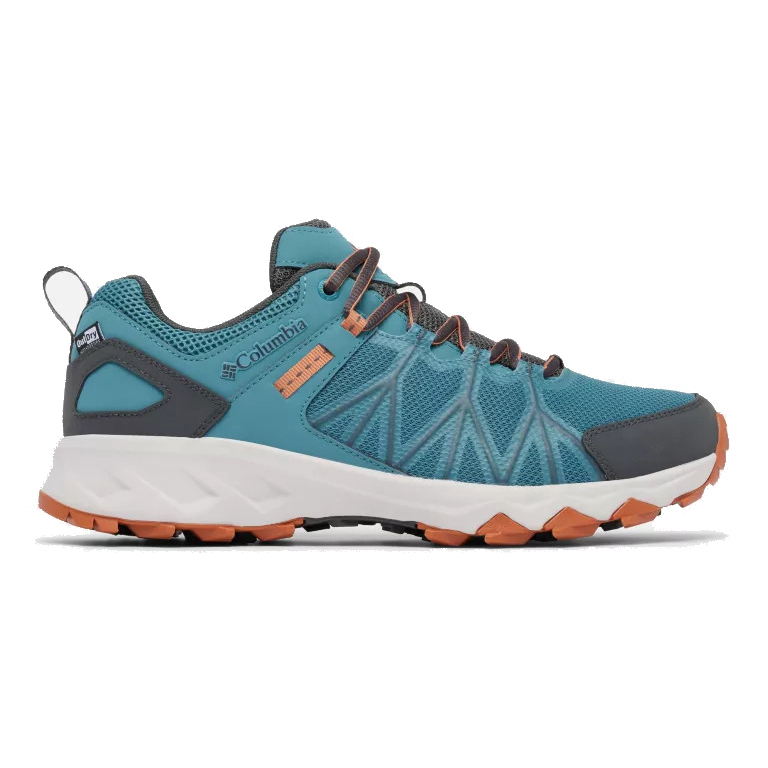
We reckon these are an ideal shoe for day hikes, with an exceptional fit thanks to the Navic Fit lacing system and plenty of cushioning provided by the single density foam midsole. Their OutDry waterproofing make them a standout when the heavens open
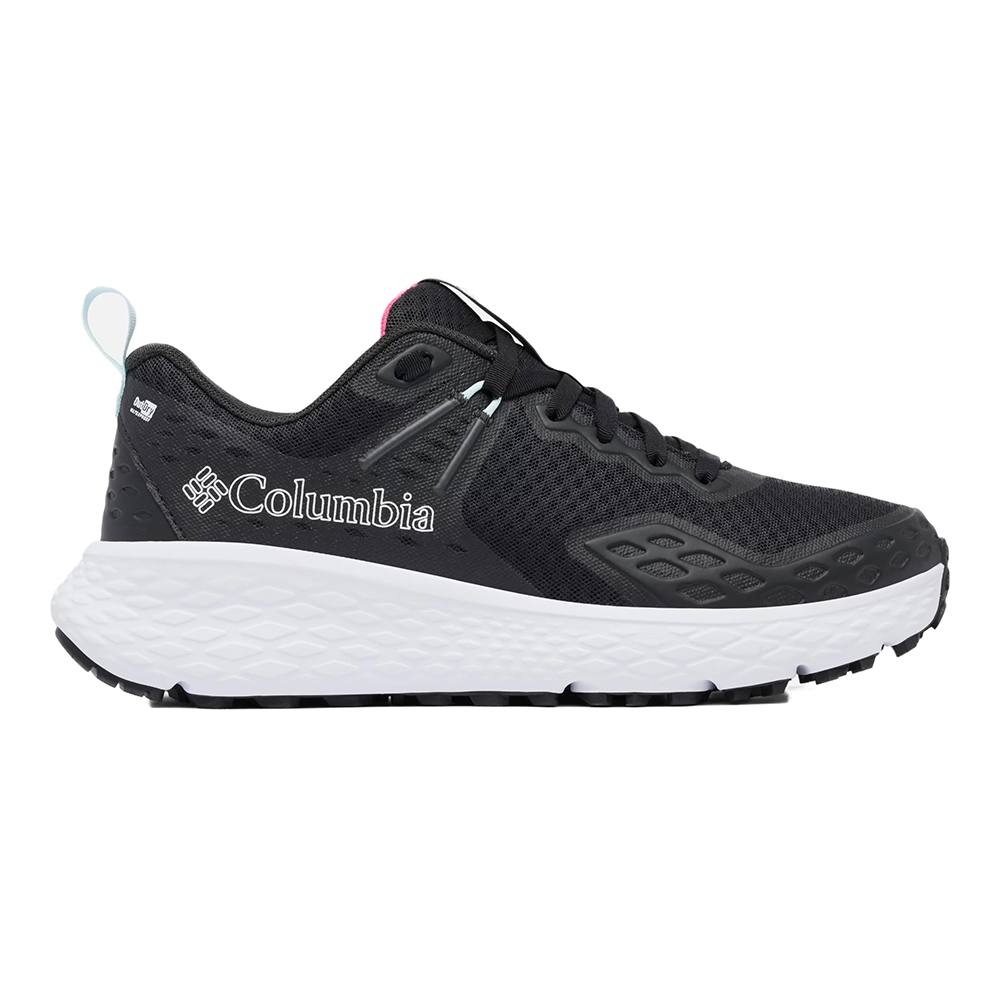
Lightweight but still offering plenty of protection, the Columbia Konos TRS Outdry hiking shoes are comfortable straight out of the box, and kept our reviewer's toes warm and dry even when striding through Scottish bogs
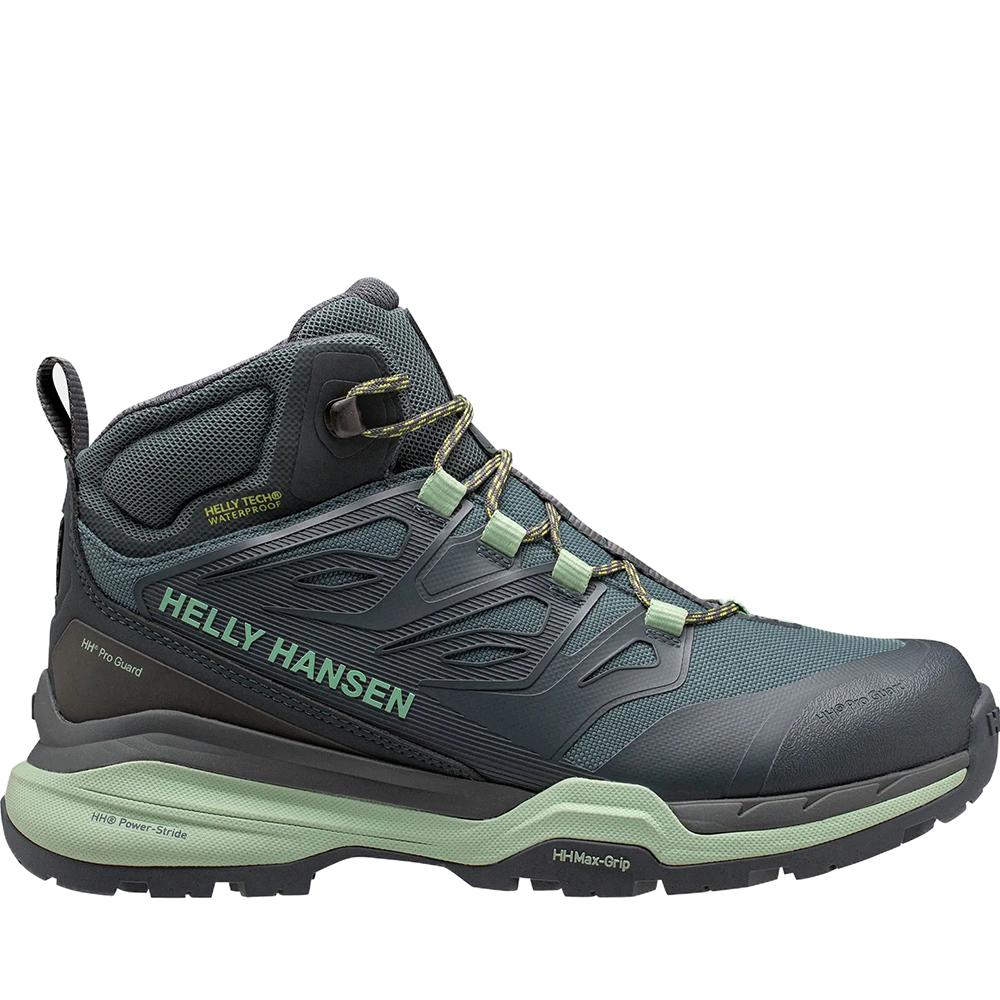
Combining the shape of a boot with the materials of a shoe, the Helly Hansen Traverse HellyTech hiking shoes are comfortable, lightweight and fully waterproof, with a supportive fit
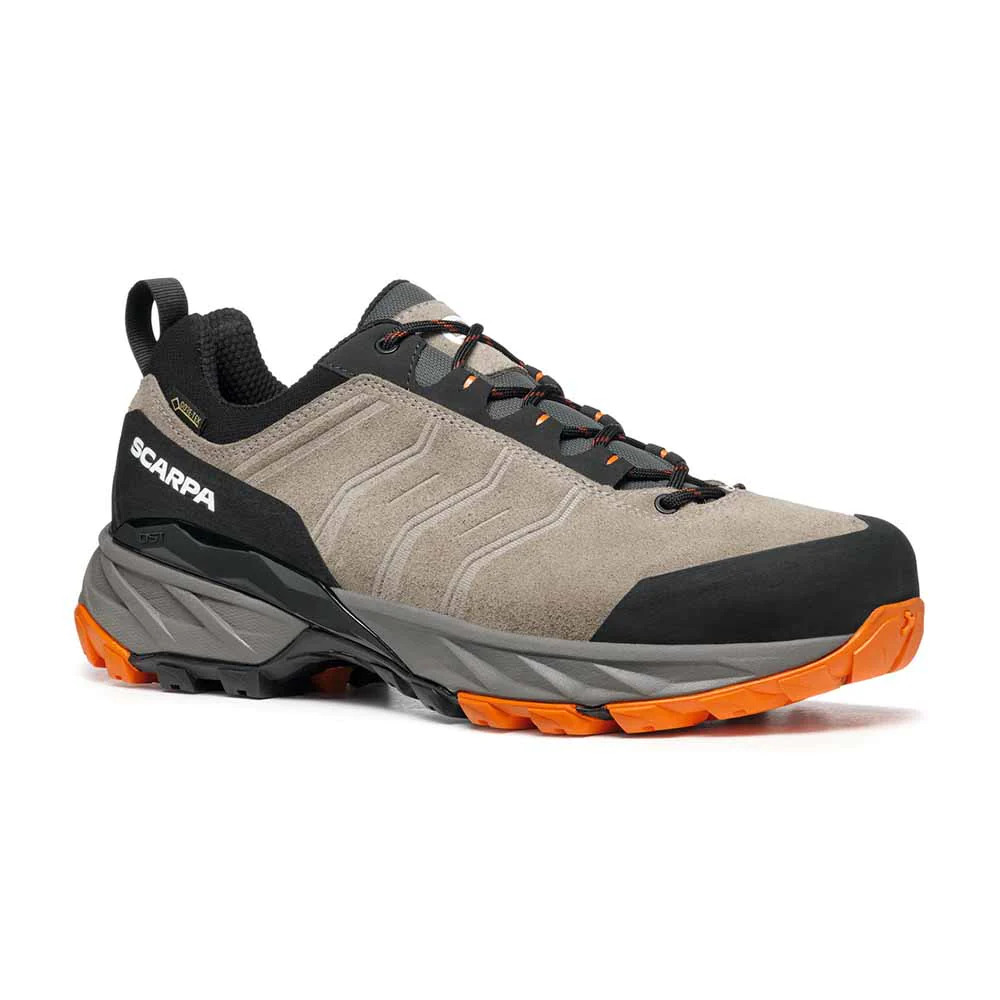
These are a great choice for tricky routes, with extra protection around the toe box and heel and a tough DST plastic insert on each side of the midsole too. We tested them on a diverse range of trails in the low alpine region and they more than met the challenge
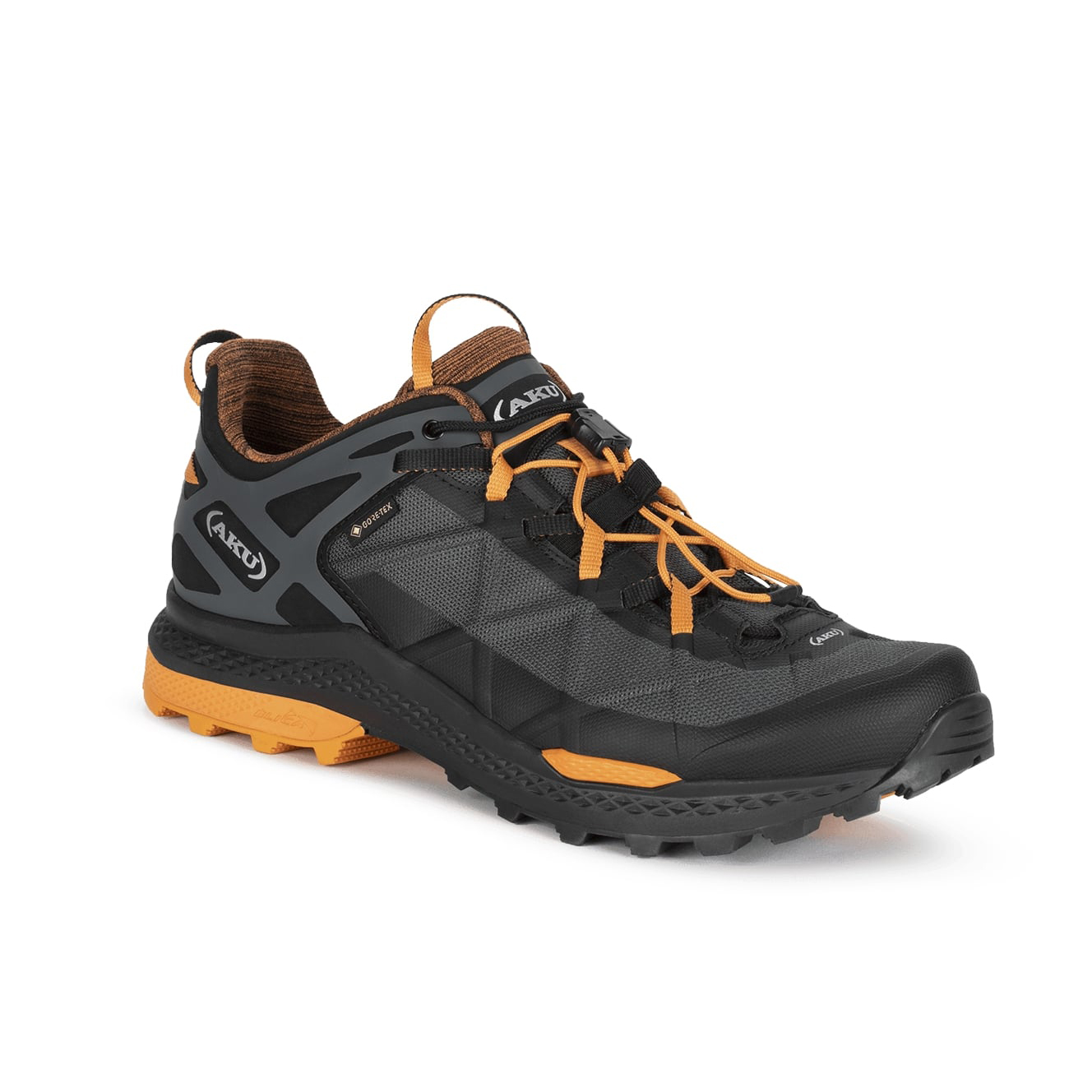
Don't be fooled by its substantial appearance. This is a surprisingly lightweight shoe that our reviewer rated highly for its scrambling suitability. We also liked the dual lacing system, which provides a confidence-inspiring closer fit around the midfoot
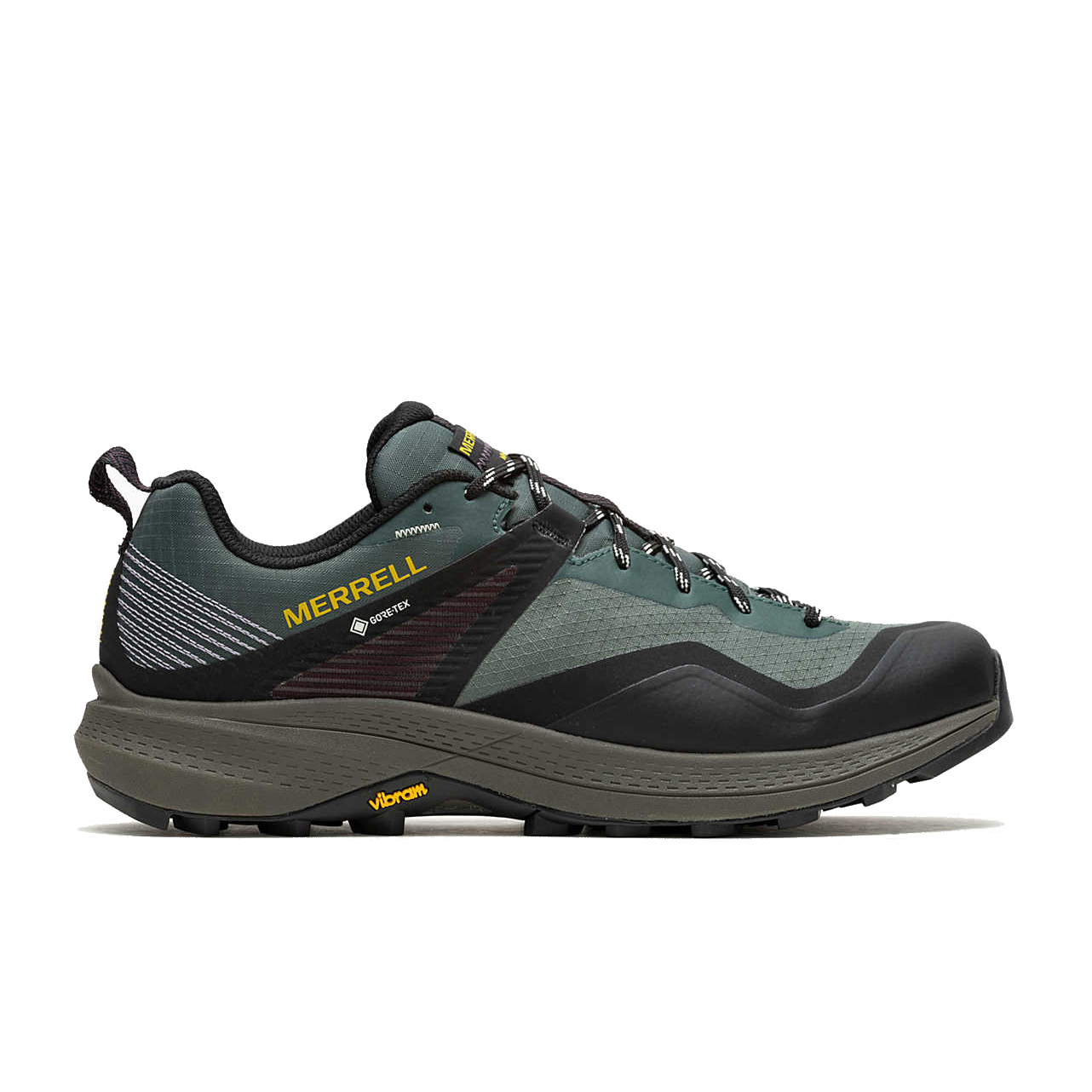
If you are seeking stability on boggy ground then this is a shoe worth considering, thanks to its excellent Vibram outsole. We found it gripped well on gravel trails and fire roads and coped particularly well with mud. Weight is saved by the mesh upper, with water protection provided by a Gore-Tex membrane
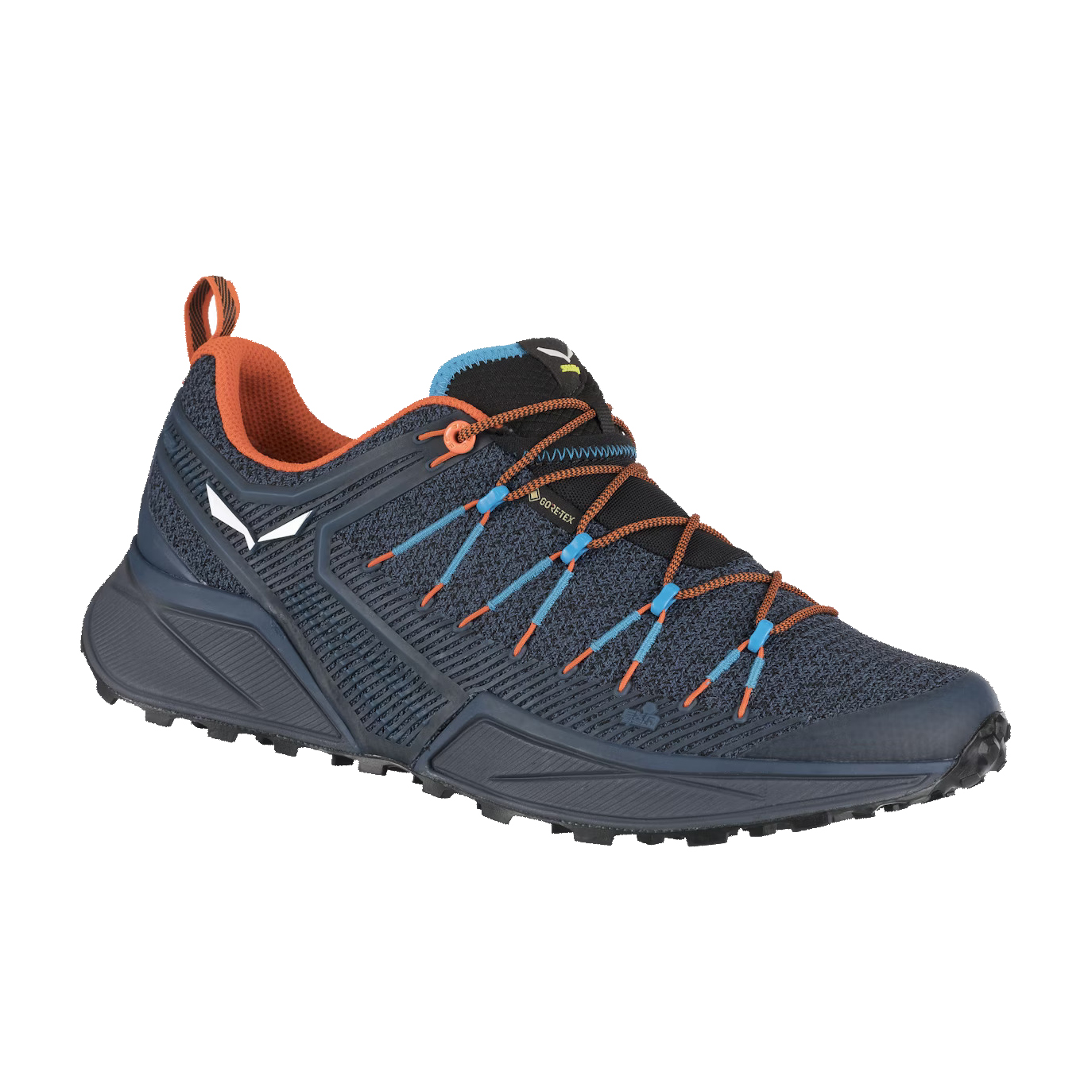
This is a deceptive shoe, that reads more like a sneaker on steroids than a hiking boot. Look closer though and you'll find the wide lacing and anti-rock heel cup add extra stability and protection where they're most needed. However, we found the low profile lugs could get clogged in muddy conditions
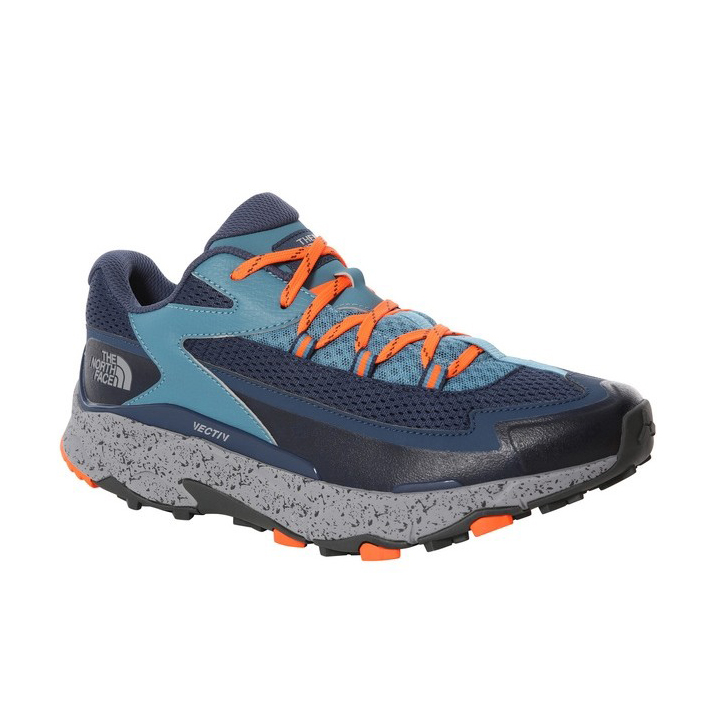
Comfortable Ortholite footbeds mean you won't need to break in these shoes, which are designed for fair weather day hikes rather than challenging conditions or technical terrain. We liked their breathability but will be saving them for sunny days
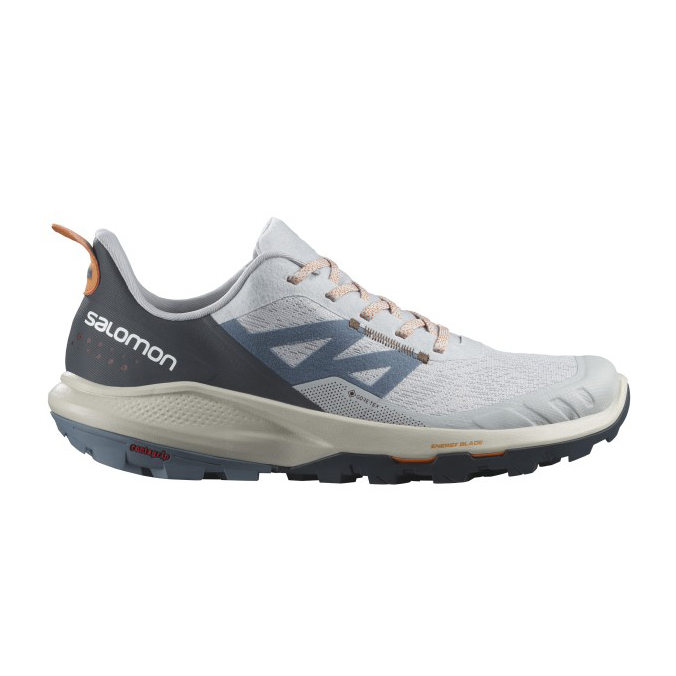
Sitting somewhere between a hiking shoe and a trail runner, this is a good choice for fast trails and day hikes, as it doesn't offer enough support for backpacking. We liked the modest 10mm drop, which should add to your sense of balance
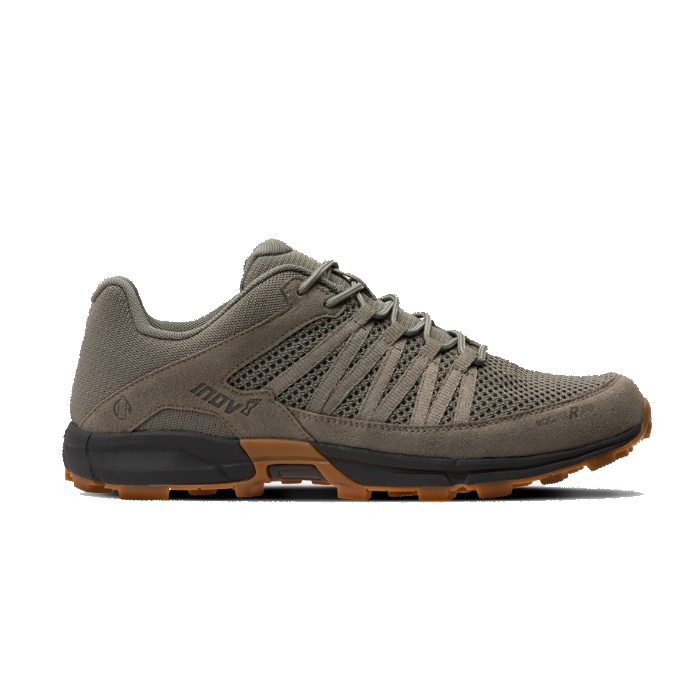
An eco-conscious design, made from 90% recycled materials - mostly discarded plastic bottles. We found them extremely lightweight and easy to wear, and appreciated the 6mm lugs, which are grippy and don't collect mud easily
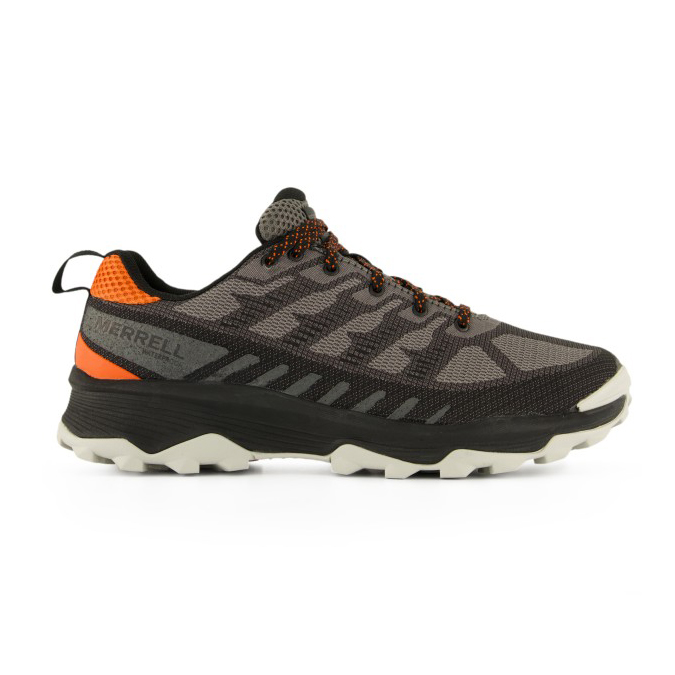
A hiking shoe designed for backcountry strolls than technical expeditions. There's some modest reinforcement around the heel and toes, but not enough that we'd use them for scrambling. A generous amount of recycled materials have been used throughout
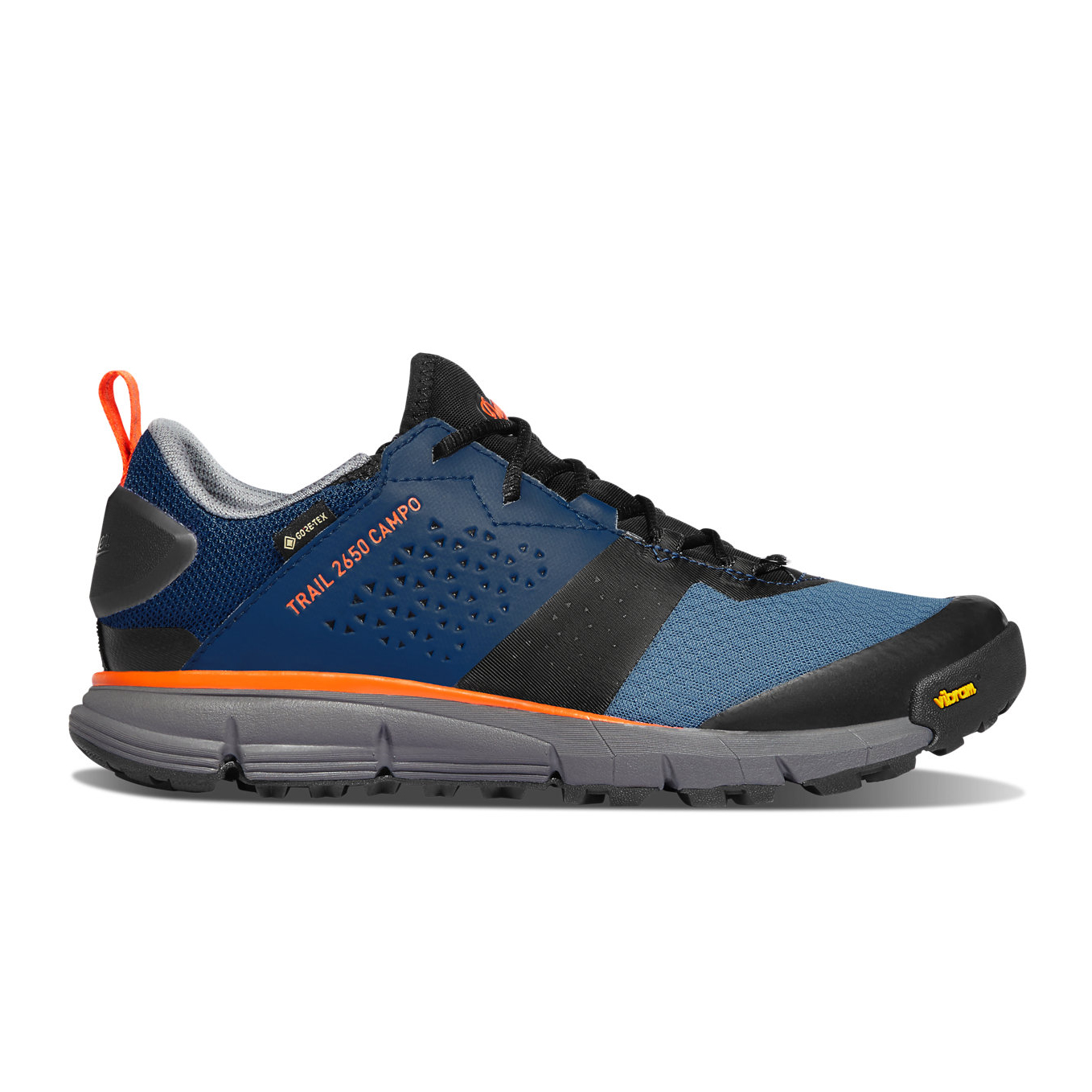
With three layers of removeable, breathable cushioning and chunky Vibram soles, we love how stable these shoes feel and wouldn't hesitate to hammer them on rough trails. Sock-style shoes can be a little tricky if you have high arches but the fit of these is fantastic once on
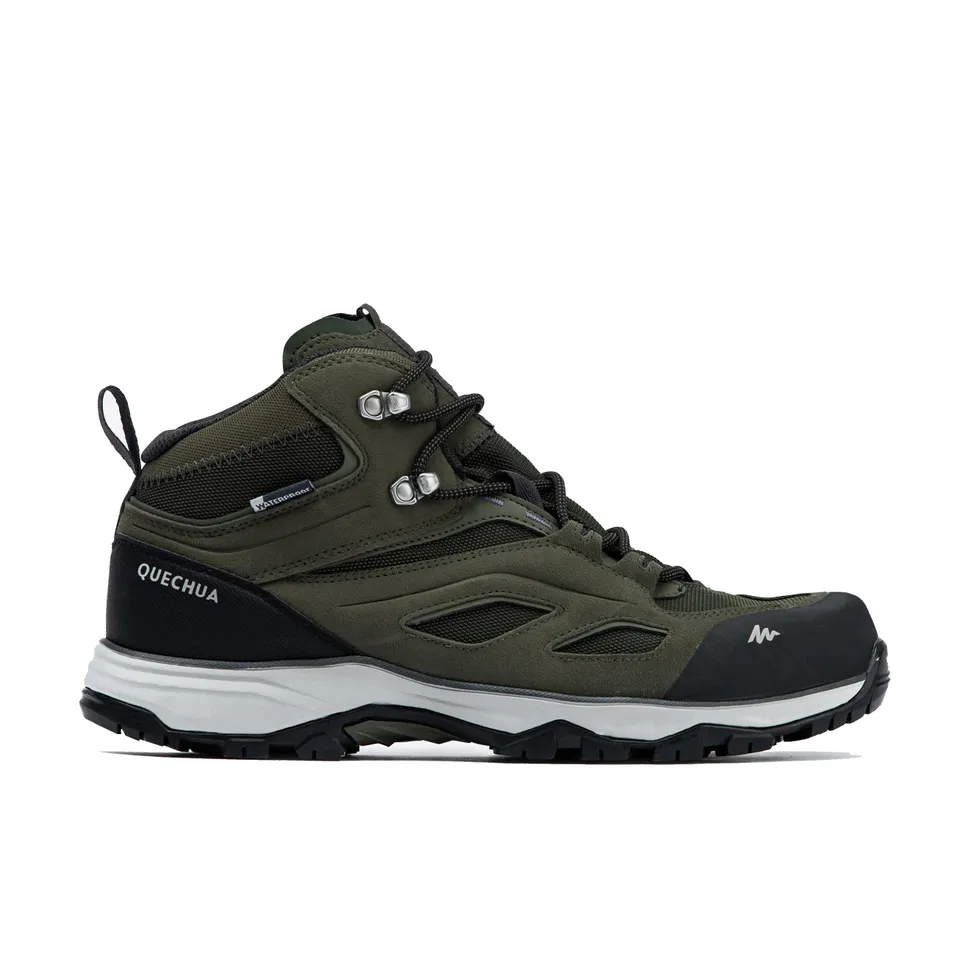 best value
best value
We agreed with Decathlon that these are best suited to half day hikes, at up to 700 meters. The retro styling will definitely divide, but beyond looks there's some decent features, with stone-guard projection and a waterproof membrane. We'd have liked a little less cushioning to make the soles more responsive
Hiking shoes comparison table
Hiking shoe | List price | Weight (per shoe) | Materials | Best use |
Helly Hansen Switchback low-cut Trail HT hiking boots | $130 (US) / £110 (UK) | 448g / 15.8oz | Leather and polyester upper; EVA insole; rubber outsole | Day hiking, multiday hut-to-hut trekking and light backpacking |
Columbia Peakfreak II Outdry Waterproof Walking Shoe | $120 (US) / £115 (UK) | 406g / 14.3oz | Polyester upper and lining; PU footbed; POE midsole; rubber outsole | Hill and mountain day hikes, as well as approach routes up to low alpine |
Columbia Konos TRS Outdry | $120 (US)/ £110 (UK) | 210g / 7.4oz | OutDry membrane, mesh uppers, OmniMax midsole, TechLite midsole, AdaptTrax outsole | All-day hiking in dry or damp conditions and on steep terrain |
Helly Hansen Traverse HellyTech Hiking Shoes | $200 (US) / £160 (UK) | 400g / 13.4oz | Upper: 100% Polyester (Recycled) - Upper 2: 100% Polyester (Recycled) - Upper 3: 60% Polyurethane 40% Polyester (Recycled) - Lining: 100% Polyester (Recycled) - Lining 2: 58% Polyester (Recycled) 32% Polyurethane 10% Cotton - Insole: 100% EVA - Outsole: 100% Rubber | Hiking on everything from boggy trails to rocky terrain |
Scarpa Rush Trail GTX | $189 (US) / £165 (UK) | Men’s: 455g / 16oz; Women’s: 430g / 15oz | Suede and mesh upper with a Gore-Tex lining; TPU midsole; Presa outsole | Ideal for hill and fell walking, and approach routes up to low alpine |
AKU Rocket DFS GTX | $189.95 (US) / £169 (UK) | 370g / 13oz | Fiber fabric and microfiber upper; Gore-Tex lining; double density PU midsole; Vibram Megagrip outsole with Vibram Rocket Traction lugs | Speed hiking and low-grade scrambles come rain or shine |
Merrell MQM 3 GTX | $150 (US) / £130 (UK) | Men’s: 640g / 1lb 7oz; Women’s: 542g / 1lb 3oz | Gore-Tex membrane; Breathable mesh and TPU upper; 100% recycled laces and webbing; Merrell Air Cushion heel; EVA foam footbed; Vibram TC5+ outsole | Hiking and trekking in all kids of conditions |
Salewa Dropline GTX | $160 (US) / £160 (UK) | 294g / 10.4oz | Exa Shell Over Injected 3D Cage upper with Stretchable Air Mesh and Tpu film; Gore-Tex waterproof lining; Ortholite footbed; EVA midsole; Pomoca Dropline outsole | Backpacking, thru hiking, fast packing, general walking |
The North Face Vectiv Taraval hiking shoes | $129 (US) / £115 (UK) | 313g / 11oz | Synthetic leather and breathable mesh upper; VECTIV™ Technology soles | Quick day hikes |
Salomon Outpulse Gore-tex | $140 (US) / £135 (UK) | Men’s (size 11): 377g / 13oz; Women’s: 300g / 10.5oz | Synthetic MCL upper; Gore-Tex membrane; Fuze Surge foam compound in the midsole; Contagrip rubber outsole | Quick day hikes, fastpacking |
Inov-8 Roclite Recycled 310s | $150 (US) / £130 (UK) | 310g / 10.9oz | Knitted 100% recycled rPET yarn upper; Bloom foam midsole (10% algae biomass); natural gum rubber undyed outsole | Hiking and fastpacking in warmer conditions |
Merrell Speed Eco Waterproof | $120 (US) / £120 (UK) | 340g / 11.9oz | 77% recycled jacquard upper; 50% recycled EVA foam footbed and EVA midsole; 30% recycled rubber outsole | Fast and light hiking in summer conditions and casual strolls |
Danner Trail 2650 Campo GTX | $200 (US) / £180 (UK) | 340g / 12oz | Leather and textile upper, Gore-Tex membrane, Vibram Megagrip sole, open-cell Polyurethane footbed | Hiking and fast packing in dry or wet conditions |
Quechua waterproof MH100 walking shoe | $55 (US) / £35 (UK) | Men's: 405g / 14oz (men's); Women's: 337g / 12oz | Poly and leather upper; waterproof and breathable membrane lining; EVA midsole; non-slip rubber outsole | Half-day sojourns into the foothills |
The best all terrain hiking shoes
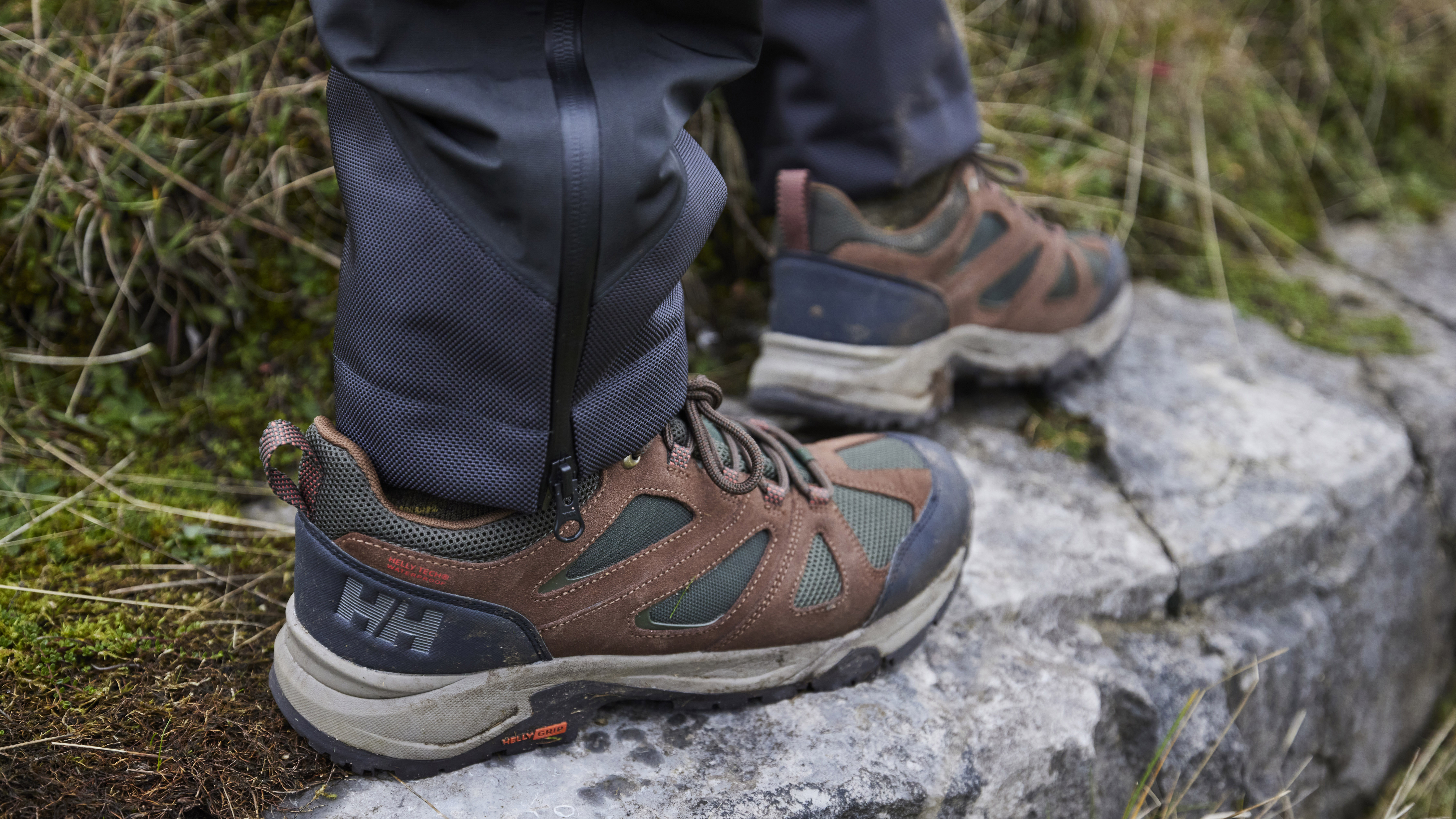
Specifications
Reasons to buy
Reasons to avoid
If you're looking for functional and fashionable footwear to take you through three seasons, these low-cut boots are worth the investment. Our tester rated them for hill walking and day hiking as well as longer hut-to-hut adventures.
They are comfortable to wear straight from the box thanks to their suede uppers. The mesh fabric sections in the leather chassis help to take down the weight and enhance breathability. A HellyTech waterproof membrane means you feet will stay dry on deluge days, too.
When it comes to the sole, chevrons and ridges give great control and traction. A heel cup and toe bumper work well to protect feet on techy trails. Inside the boot there's ample cushioning for long days on the hills.
An integrated tongue keeps out trail debris. A secure lace system with loops and eyelets creates great stability, although the low-cut design means you get less support than from a pair of winter boots.
Our expert tester Pat Kinsella found that in ultra-sloppy conditions the densely packed lugs do accumulate mud, as does the mesh on the upper. These small criticisms don't detract from the fact the Switchbacks are an excellent choice for daylong adventures over three season. They are also great value.
Read our full Helly Hansen Switchback Trail Low-Cut Helly Tech hiking boots review
The best hiking shoes for day hikes
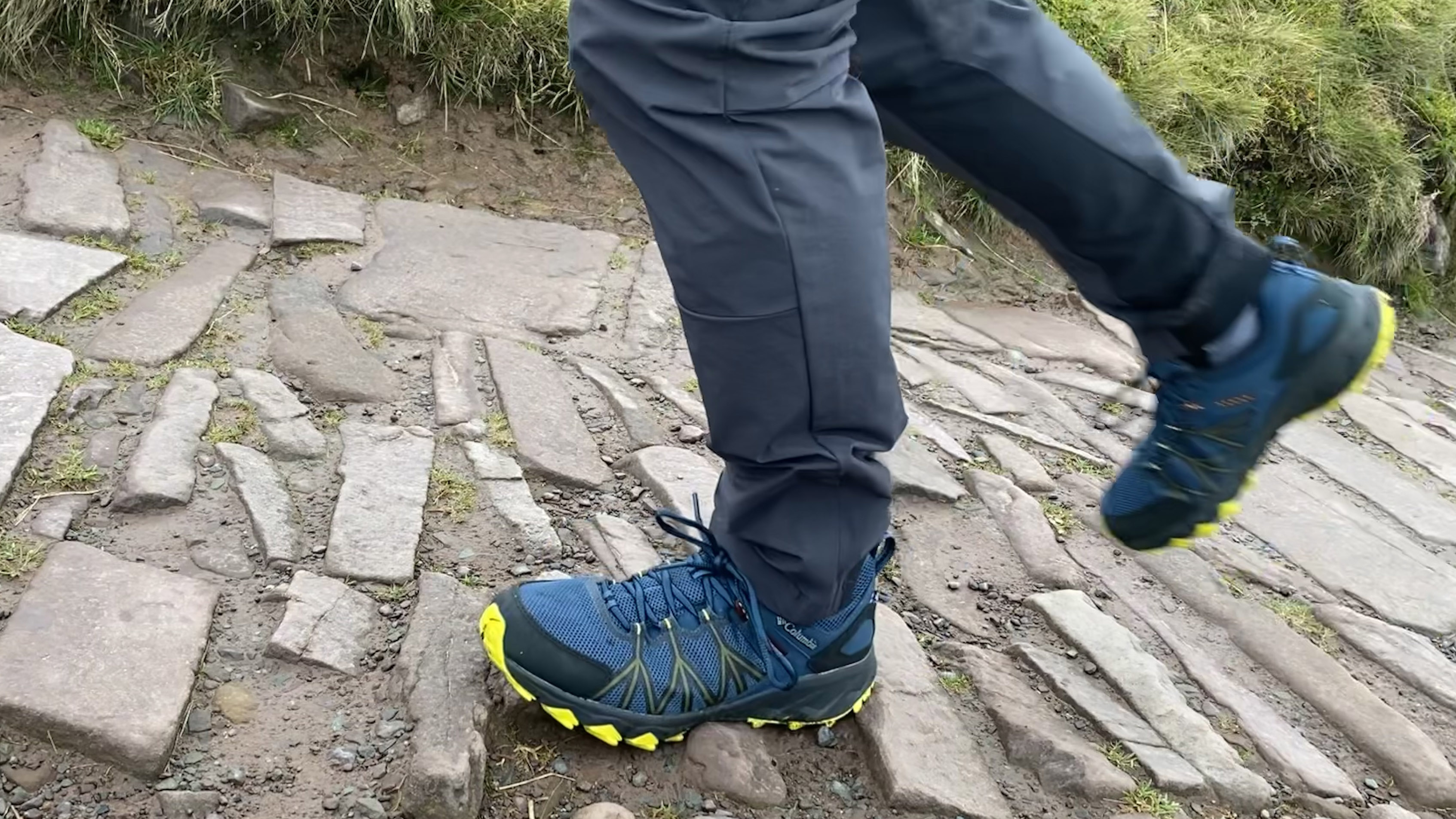
Specifications
Reasons to buy
Reasons to avoid
With a sneaker-like appearance and seamless mesh upper, the second iteration of Columbia's Peakfreaks are stylish and modern. They are a pair of hikers that are at home both on the trails and away from them.
The latest updates have made the shoes exceptionally comfy from the off. The uppers have lots of flex and the foam midsole gives plenty of cushioning while still being responsive to the terrain beneath your foot.
A secure lacing system keeps your midfoot locked down, adding to the secure feel you get when wearing them on fast day hikes over a range of terrains.
Despite their comfort and light weight, they still perform in downpours thanks to Columbia's OutDry waterproofing technology. And the breathable mesh upper means your feet won't overheat on steep inclines or when the sun is at its highest.
The sticky rubber sole is said to adapt to both slick and dry surfaces, and in the field our tester Alex Foxfield found it stood up to its claim. The shoes made easy work of rock scrambling, too. Although, once you start on tougher ascents, a designated approach shoe would give you more confidence.
Simply said, the Peakfreak IIs are very good hiking shoes.
Read our full Columbia Peakfreak II Outdry Waterproof Walking Shoe review
The best waterproof hiking shoes
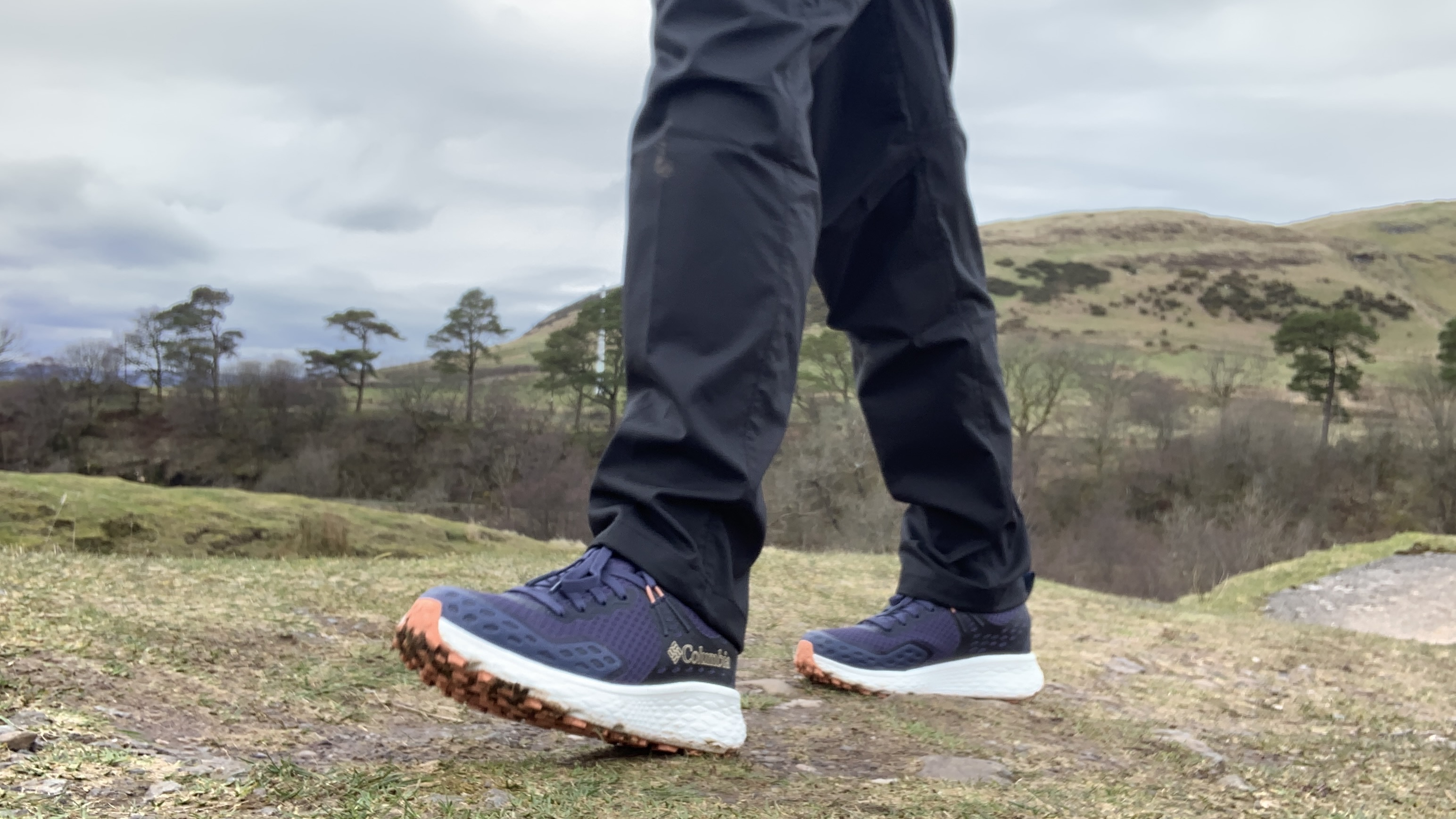
Specifications
Reasons to buy
Reasons to avoid
Finding the sweet spot between weight, comfort and protection, the Columbia Konos TRS Outdry hiking shoes combine a plush midsole with deep forefoot grooves and strong traction on steep or wet trails.
That midsole helps to absorb impact as you walk and return energy to you as you move, while the forefoot grooves ensure the shoes flex well and let your toes bend as you walk. The lugs in the outsoles don't look especially deep, but our expert reviewer Julia Clarke found the Columbia Konos TRS Outdry hiking shoes kept her stable on a grassy slope she often slipped on in other footwear.
Those with wider feet may find the toebox a little narrow, but the lacing system can help here and generally these are an incredibly comfortable wear right out of the box, with no breaking in needed. Reinforced uppers give protection on rocky trails without adding too much weight.
Best of all, the shoes are waterproof (tested on some of Scotland's boggiest trails) without losing too much breathability, though we should caveat that we didn't test them in the middle of summer. Hopefully waterproof shoes aren't such a priority then, anyway.
The Columbia Konos TRS Outdry hiking shoes are true to size, and give a secure fit around the heel and midfoot. They're a little too snug to pair with thick hiking socks, but those are more appropriate to boots. They're also great value.
Read our full Columbia Konos TRS Outdry review
The most comfortable hiking shoes
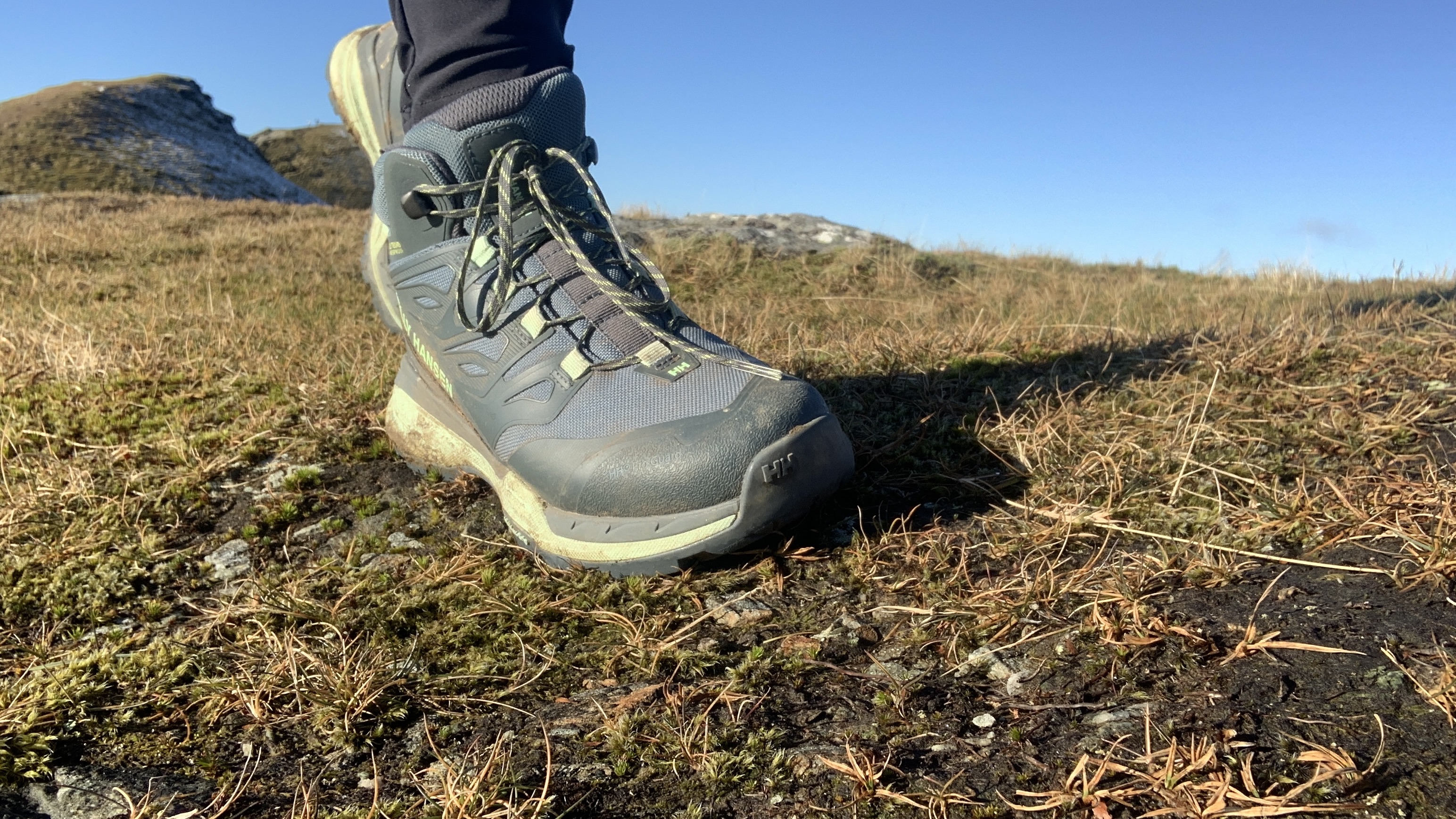
Specifications
Reasons to buy
Reasons to avoid
Bridging the divide between traditional leather hiking boots and modern trail shoes, the Helly Hansen Traverse HellyTech Hiking Shoes use the materials of a shoe with the shape of a boot, aiming to provide the best of both worlds. If you want a little more boot for your buck, however, they do also come in a full boot version that reaches higher up the ankle.
The Helly Hansen Traverse HellyTech Hiking Shoes are fully waterproof (our reviewer Julia Clarke stood in a stream with them to test this and they passed with flying colors) and stay breathable on steep and sweaty hikes, in the cool weather months at least.
The only issue Julia found with them is an occasional slip on very slick descents, but the traction is still good enough for more trail hikes. They're nice and stable around the ankle, with a secure, supportive fit throughout the foot. Julia had to size up slightly, so do take that into consideration when ordering, especially if you're a fan of thicker hiking socks.
They're also comfortable and wearable straight out of the box, with no breaking in required before heading out on the trails.
Read our full Helly Hansen Traverse HellyTech Hiking Shoes review
The best hiking shoes for demanding terrain
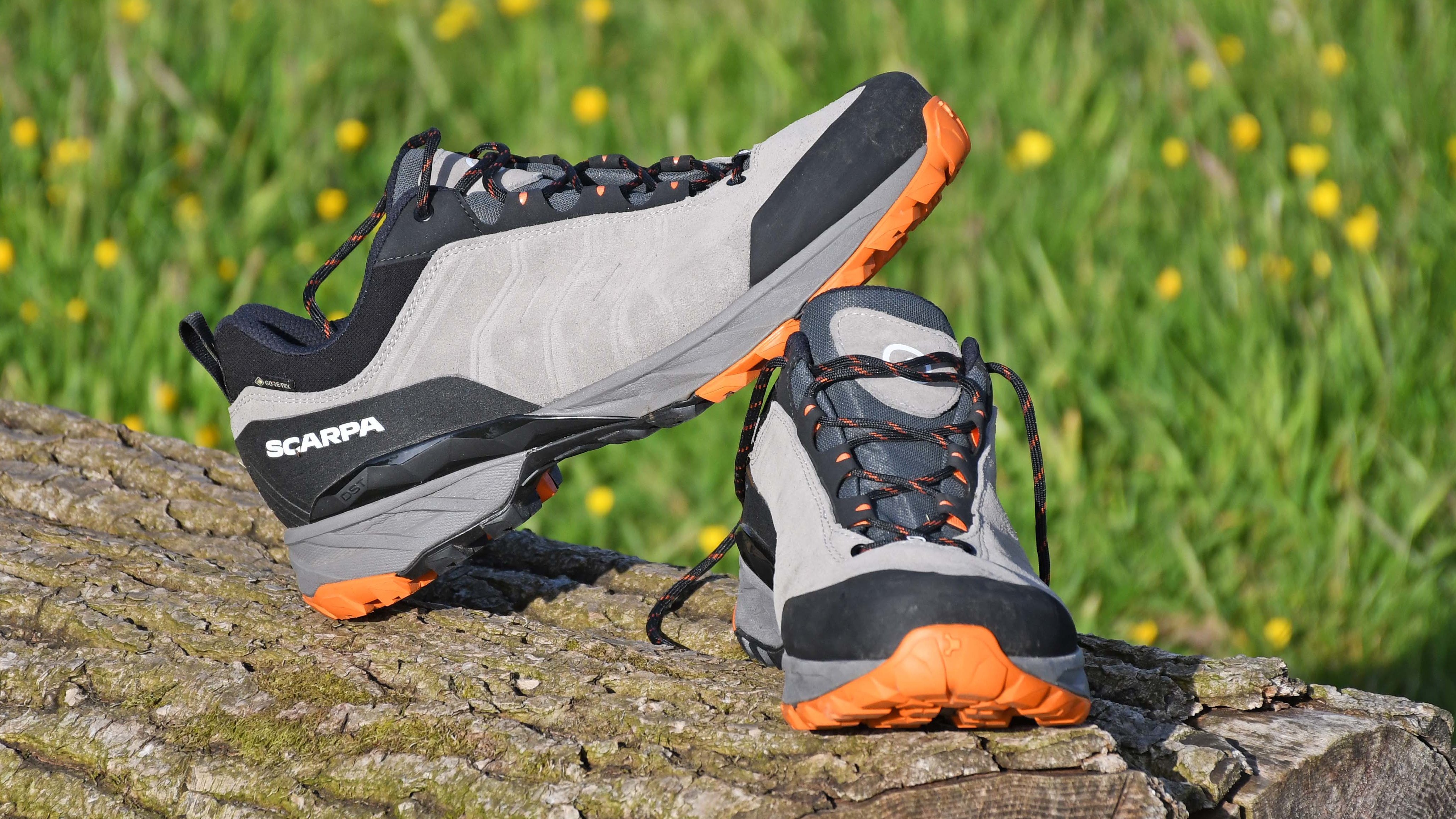
Specifications
Reasons to buy
Reasons to avoid
Meet the low-cut version of Scarpa’s Rush Trail GTX hiking boot. If you're hunting for comfortable footwear to help you eat up miles and take on technical ground, these really are one of the best all-terrain shoes you'll find.
Our reviewer Pat Kinsella said the fully integrated tongue and sturdy lace system did a great job of keeping feet secure and preventing trail debris from working its way into the boot.
To boost protection, there's a plastic insert in the midsole and reinforcements around the toe box and heel. Thanks to this, and the reasonable amount of rigidity in the shoe, they'll stand up to rock edging. Plus, the Presa outsole offers great grip.
A Gore-Tex membrane completes the boots' weather protection, while a sumptuously soft suede upper and cushioned ankle padding means comfort isn't compromised. There's a good amount of cushioning in the midsole too, which will keep you trekking over long distances.
All in all, this is a great boot to give you extra confidence on technical trails in the low-alpine region, or at higher altitudes in good conditions.
Read our full Scarpa Rush Trail GTX review here
The best hiking shoes for speed on technical trails
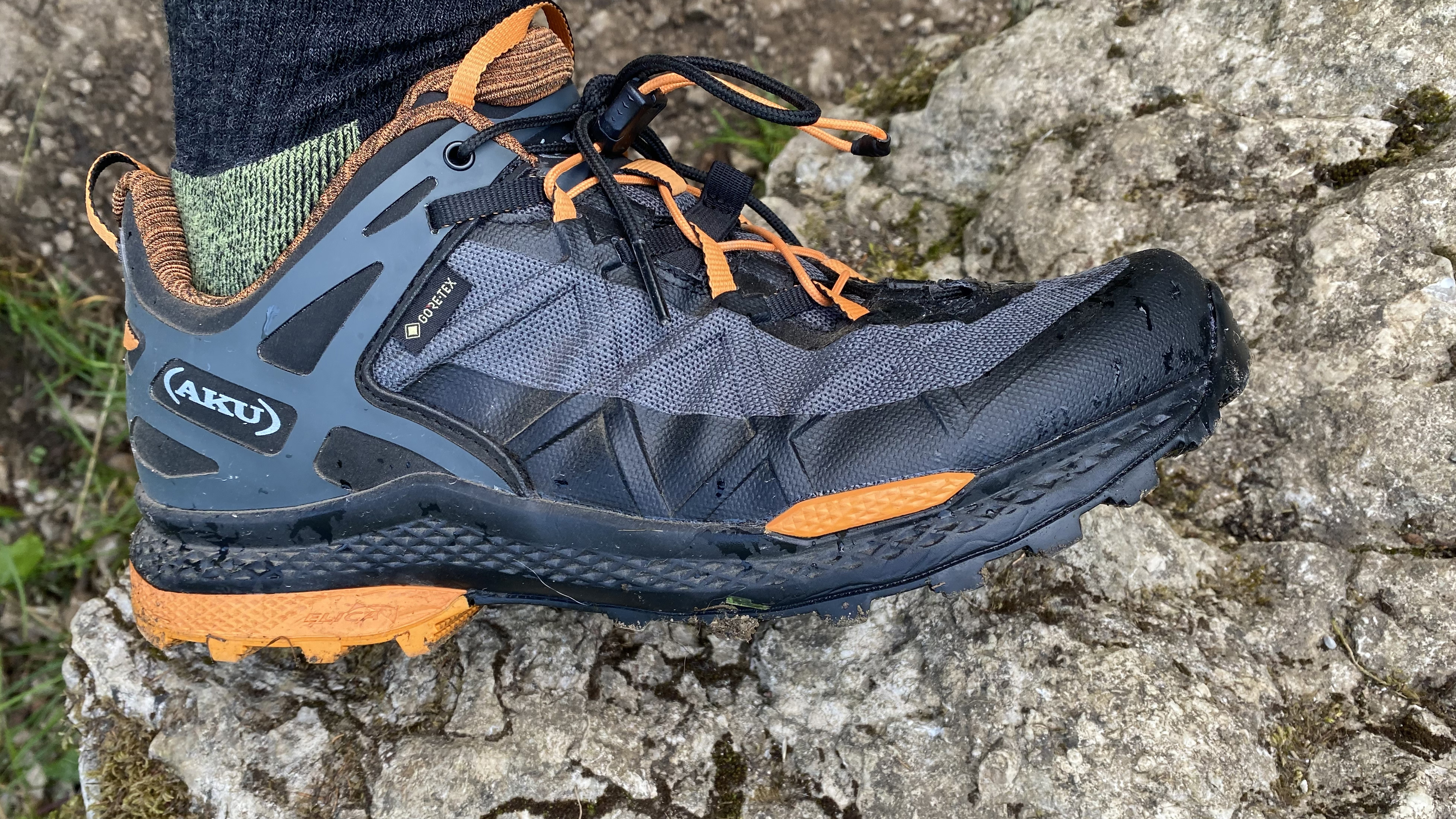
Specifications
Reasons to buy
Reasons to avoid
AKU launched the Rocket DFS GTX into the fast-hiking market with ambition to be better than the rest. On paper, they look like high-performing shoes: lightweight materials, Gore-Tex waterproofing, dual lacing system.
After putting them through their paces in the field, our tester Alex Foxfield awarded them a 90% rrating that was almost perfect, describing them as a technical fast hiker that is still light and comfy.
The DFS in the name stands for Dual Fit System, which refers to the extra set of laces that can be used to tighten up the shoe around the midfoot for extra support. On technical terrain this gave increased precision, making them a smart choice for scrambling as well as hiking.
While they look sturdy and boot-like, our tester found them lighter than many hiking shoes. And they were comfortable and agile on the trails.
Vibram Megagrip technology in the soles ensured enhanced traction on a variety of terrains and in all conditions, from bone dry to sodden.
Deep 'traction lugs' combined with 'micro lug-shaped elements' increased the amount of rubber gripping the ground at one time, giving unparalleled traction.
Overall, they are a very capable fast-hiking shoe.
Read our full AKU Rocket DFS GTX review
The best hiking shoes for muddy conditions
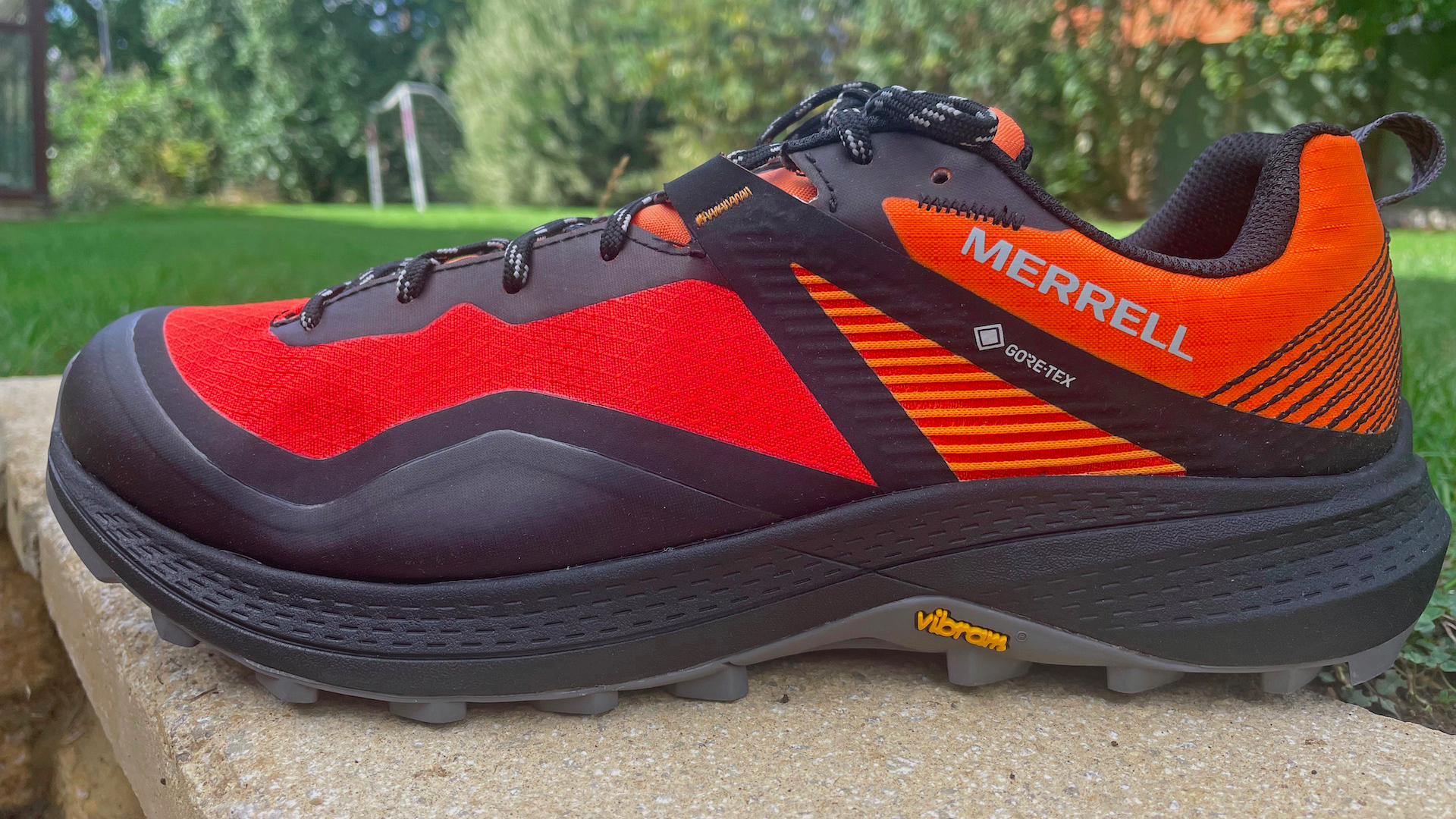
Specifications
Reasons to buy
Reasons to avoid
The MQM in the name of these Merrell hikers stands for 'moving quickly in the mountains', and the third generation of the shoes gives you better chance than ever of doing this thanks to their light weight and excellent grip.
The mesh upper shaves off considerable weight while a sturdy Vibram sole with stiff shank keeps you stable on technical terrain.
Despite the high-performing waterproof membrane, our tester Jonathan Manning found the shoes breathable enough to cope with warm days on the hills. Just remember that the low cut means you'll need to skirt puddles and hop streams.
The 5mm lugs can handle loose trails as well as gloopy mud, while the cushioned sole keeps things comfy on gravel paths and broken terrain, even when carrying a load.
Merrell suggests you can run in the MQM 3s, but Jonathan found the rigid shank made this a stretch and suggests opting for a more supple shoe if you want to up your pace.
Finally, the contemporary look (they are available in blue and bright orange colors as well as black and grey) means you're more likely to rely on them as your one pair of shoes for hiking holidays.
Read our full Merrell MQM 3 GTX review
The best hiking shoes for fastpacking
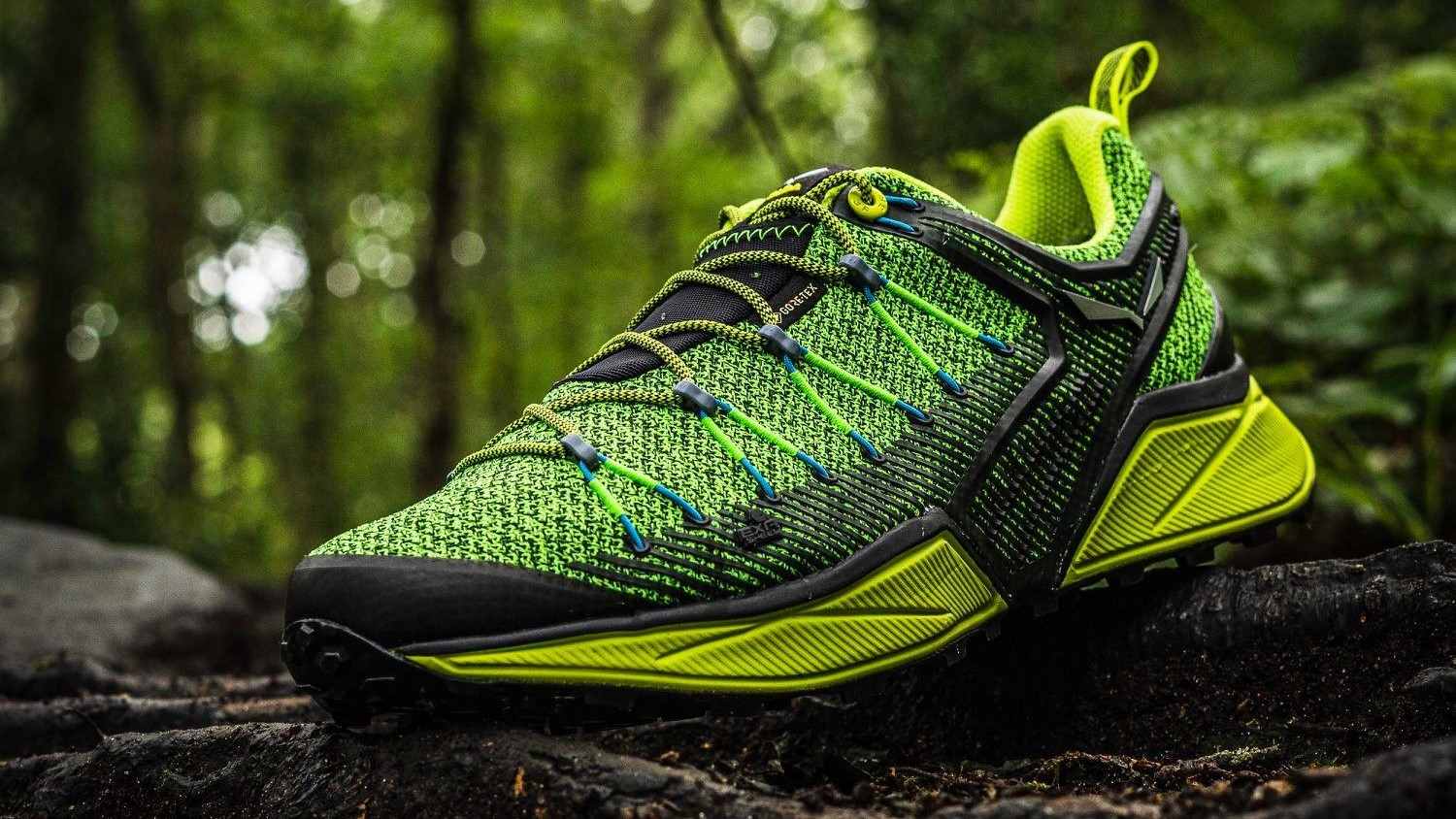
Specifications
Reasons to buy
Reasons to avoid
When it comes to thru hiking, many of us prefer hiking shoes as opposed to boots because of their light weight and how quickly we can dry them at the end of the day. However, finding a quick-drying shoe that balances support and durability with comfort is tricky.
Our Vermont-based expert tester Berne Broudy was thrilled when she realized the Dropline offered great stability as well as comfort, describing it as a 'sneaker on steroids'.
It's a low-cut shoe that feels nimble on the trails but offers enough stability to hike with a pack. The heel cup and secure lacing kept things secure, while the shaped sole you saves energy in your stride. It impressed our tester, who after four days on the trail was not beaten.
The Gore-Tex ‘Extended Comfort’ lining kept her feet dry on wet trails, and after a downpour the shoes dried quickly. Beefy toe protection reveals that Salewa expects this hiking shoe to be used on technical terrain, which she covered comfortably.
Whether bushwhacking overnight up Vermont’s highest peak or fasthiking in the day, the Droplines gave our tester a summer of fun, and were still going strong at the end of it.
Rear our full Salewa Dropline GTX review
The best sneaker like hiking shoes
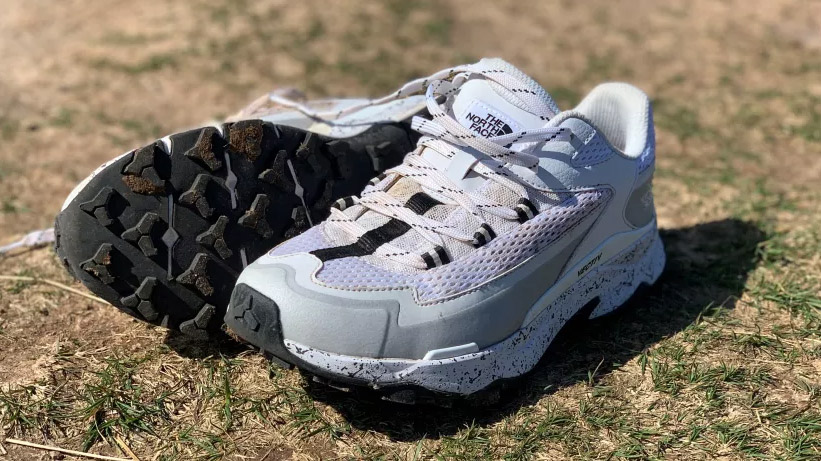
Specifications
Reasons to buy
Reasons to avoid
While white hikers may not be a top choice for muddy schleps or wet weather days on the hills, North Face's Vectiv Taraval hiking shoes excel in fair weather on a variety of surfaces.
Most notable is their comfort. The plush rocker sole and 6mm drop are designed to propel you along the trail with minimal effort. The uppers are light and roomy and and they let your feet breathe beautifully.
Despite the shoes having a Gorpcore design, which our tester Julia Clarke isn't a huge fan of, she rated their technical features: the soles are surprisingly stable with good traction on uneven terrain. And although not designed for wet-weather walks, she did admit they would dry out quickly.
As long as you're not planning a challenging hike, these lightweight shoes will take you for miles on warm, bluebird days. They do feature toe protection, but excel on flat trails and easy, social walks.
Read our full The North Face Vectic Taraval hiking shoes review
The best lightweight hiking shoes
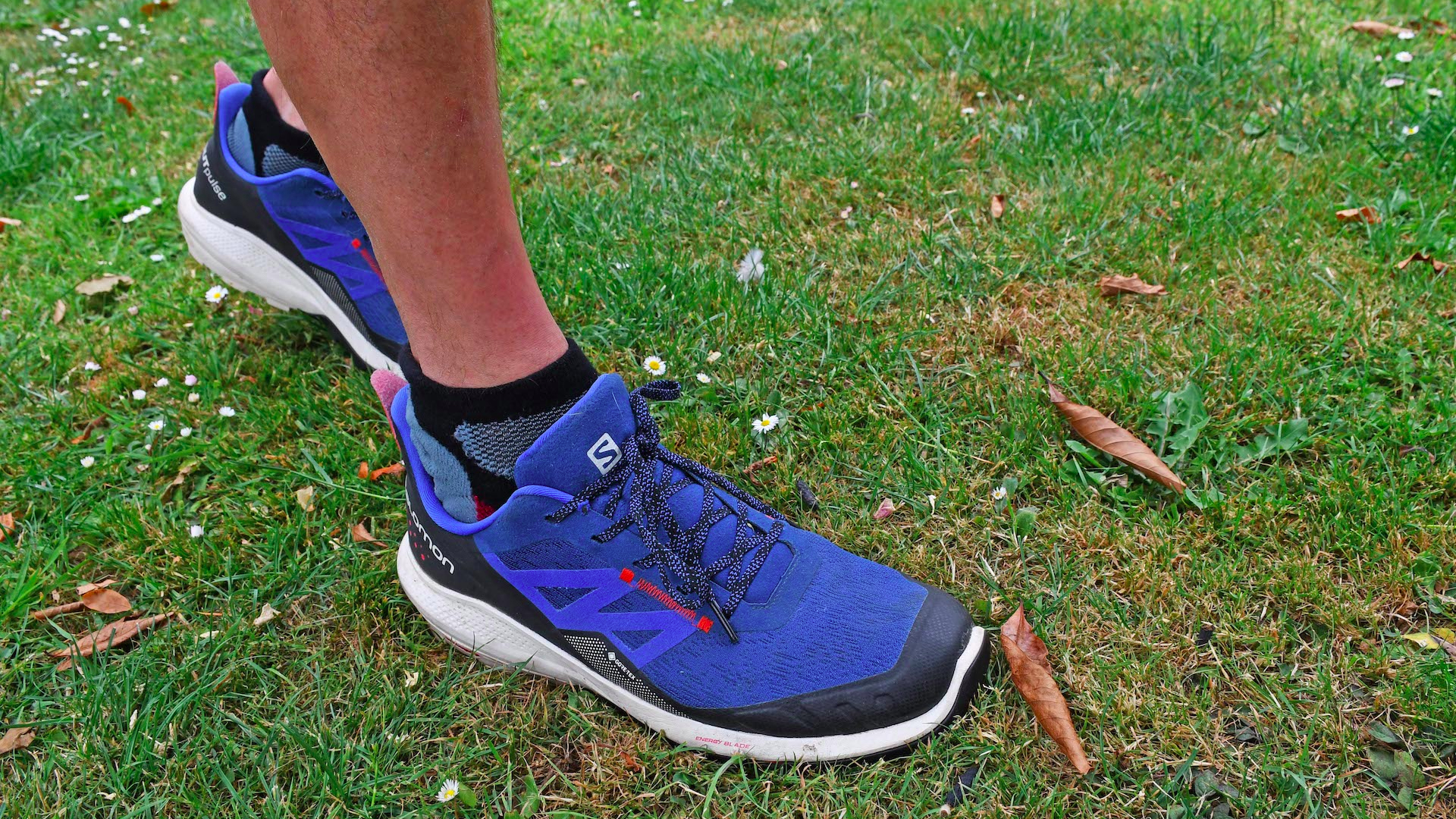
Specifications
Reasons to buy
Reasons to avoid
Day hikers take note, these shoes will help you move fast on easy trails and promise months of fair-weather fun.
While the Outpulse doesn't boast the protective features a more traditional hiking shoe offers, such as hefty toe cap or chunky outsole, our reviewer Pat Kinsella felt it makes up for it in its lightweight, breathable design.
The upper is fully waterproof and breathable thanks to its thanks to the Gore-Tex membrane, and the Contagrip rubber outsole is grippy with adequate lugs, meaning it will see you through the shoulder seasons.
A small 10mm heel-to-toe drop is great for balance, keeping your center of gravity low. The midsole is nicely cushioned with 'Fuze Surge' foam giving you comfort in every stride.
A lightweight plate incorporated into the midsole gives you some trail protection, while the integrated tongue keeps grit out.
While the Outpulses won't last as long as some of the heavier and more robust walking shoes on the market, and they're not supportive enough to hike with a pack, will be your go-tos for day treks when you want to travel fast and light.
Read our full Salomon Outpulse Gore-Tex review
The best hiking shoes for trail feel
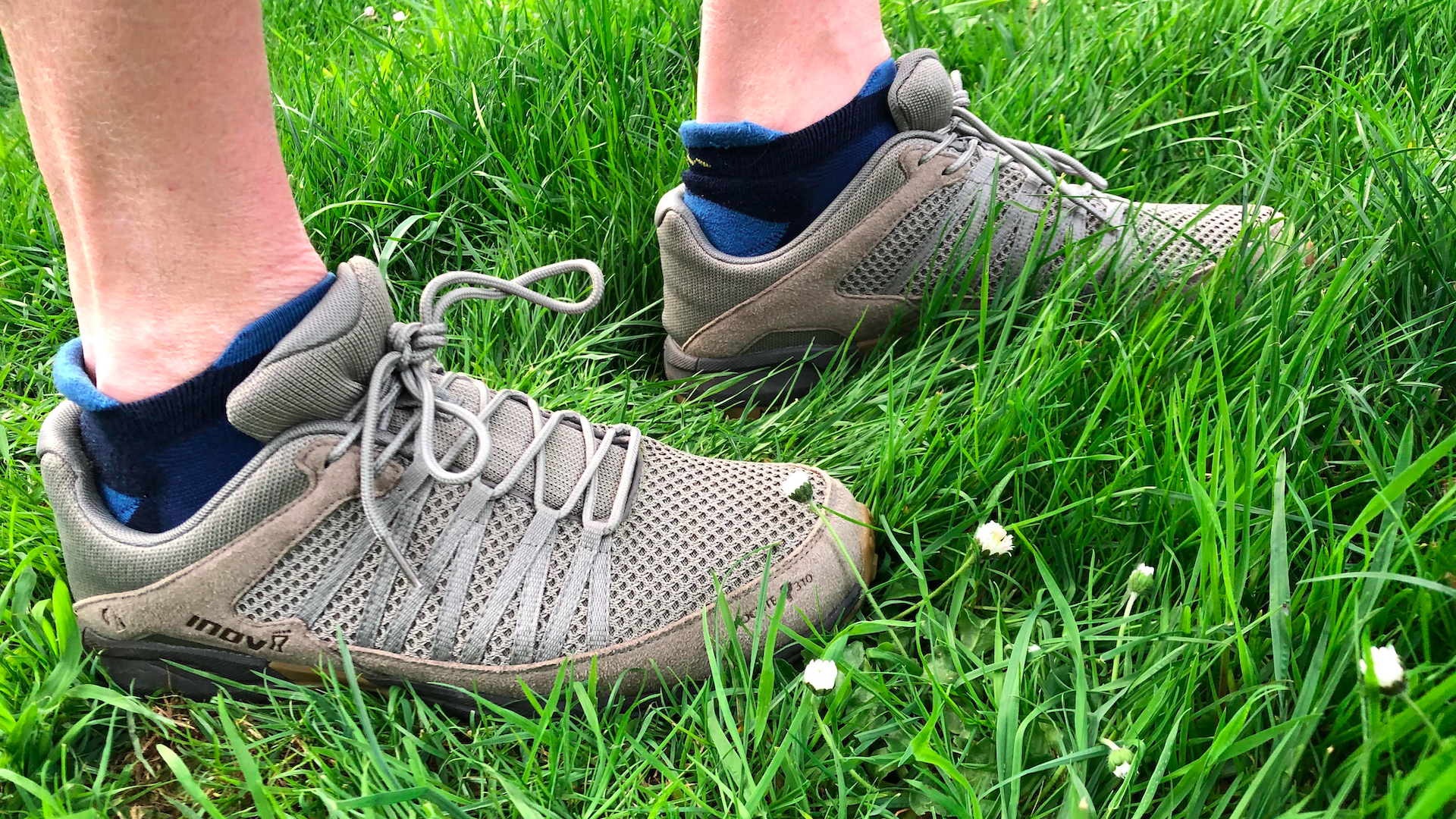
Specifications
Reasons to buy
Reasons to avoid
While most of the shoes on test here offer some kind of waterproofing, the Roclite Recycled 310s are different in that they are pitched towards eco-conscious buyers who are looking for sustainable hikers.
They are constructed of 90% recycled materials – mainly previously discarded plastic bottles. The laces are recycled too, and the midsole is made from foam that’s 10% algae biomass, which is reported to contribute positively to the environment when harvested.
Make-up aside, our tester Pat Kinsella found them soft and easy to wear for hikers who want to stay nimble and light on the trails.
He loved the fact the shoes "move dynamically with your feet" and have a 'slipper-level' of comfort. The graphene-based outsole promises a fair amount of durability.
They lack a little in foot protection, with the lightweight rand not putting up much of a fight against trail hazards. However, the soles are grippy and the understated design suits well the eco-conscious approach of the shoes.
Read our full inov-8 Roclite Recycled 310 review
The best hiking shoes for summer
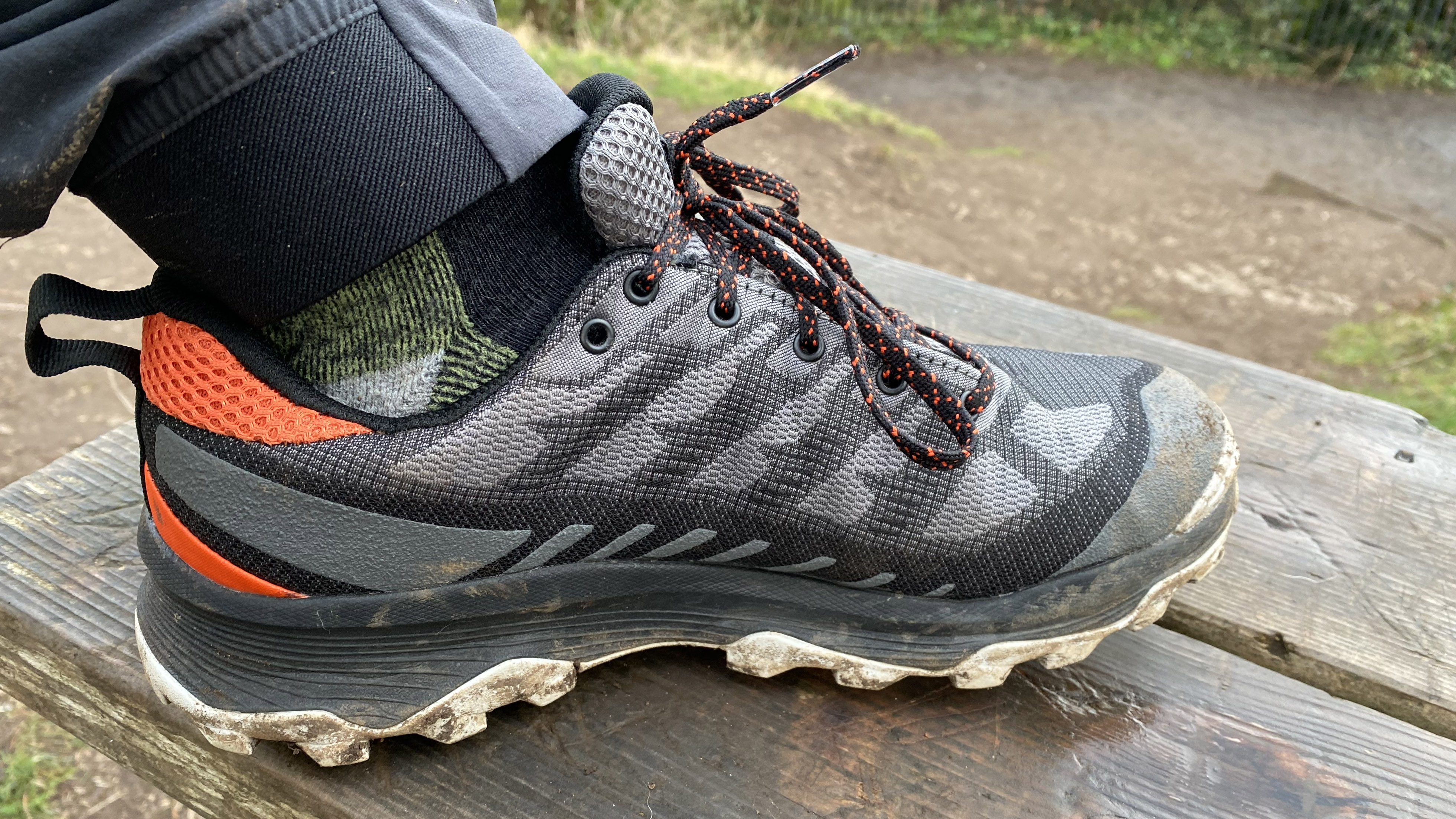
Specifications
Reasons to buy
Reasons to avoid
The Speed Eco Waterproof shoes are Merrall's most eco-friendly hiking shoes to date, and the sustainable credentials don't compromise technical performance.
The laces and webbing, mesh lining and mesh footbed cover are all made completely made from recycled materials.
The waterproof membrane keeps water out while remaining breathable enough to stop them getting damp inside. There's a little protection around the heel and toes and the outsole is noticeably wide, helping with traction.
The shoes have a sneaker-like aesthetic and a light weight of just 340g per shoe which our tester Alex Foxfield thought would appeal to speed hikers and warm-weather walkers.
Of course, for technical expeditions and ambitious scrambles, they're not protective enough, but you’ll still get plenty of use out of the Speed Ecos. They are ideal for casual hikes and backcountry strolls, when you want to maximise comfort and pace.
Just remember to skirt boggy terrain as the low cut means water seeps over the cuff easier than with other models on test here.
Read our full Merrell Speed Eco Waterproof review
The best hiking shoes for stability
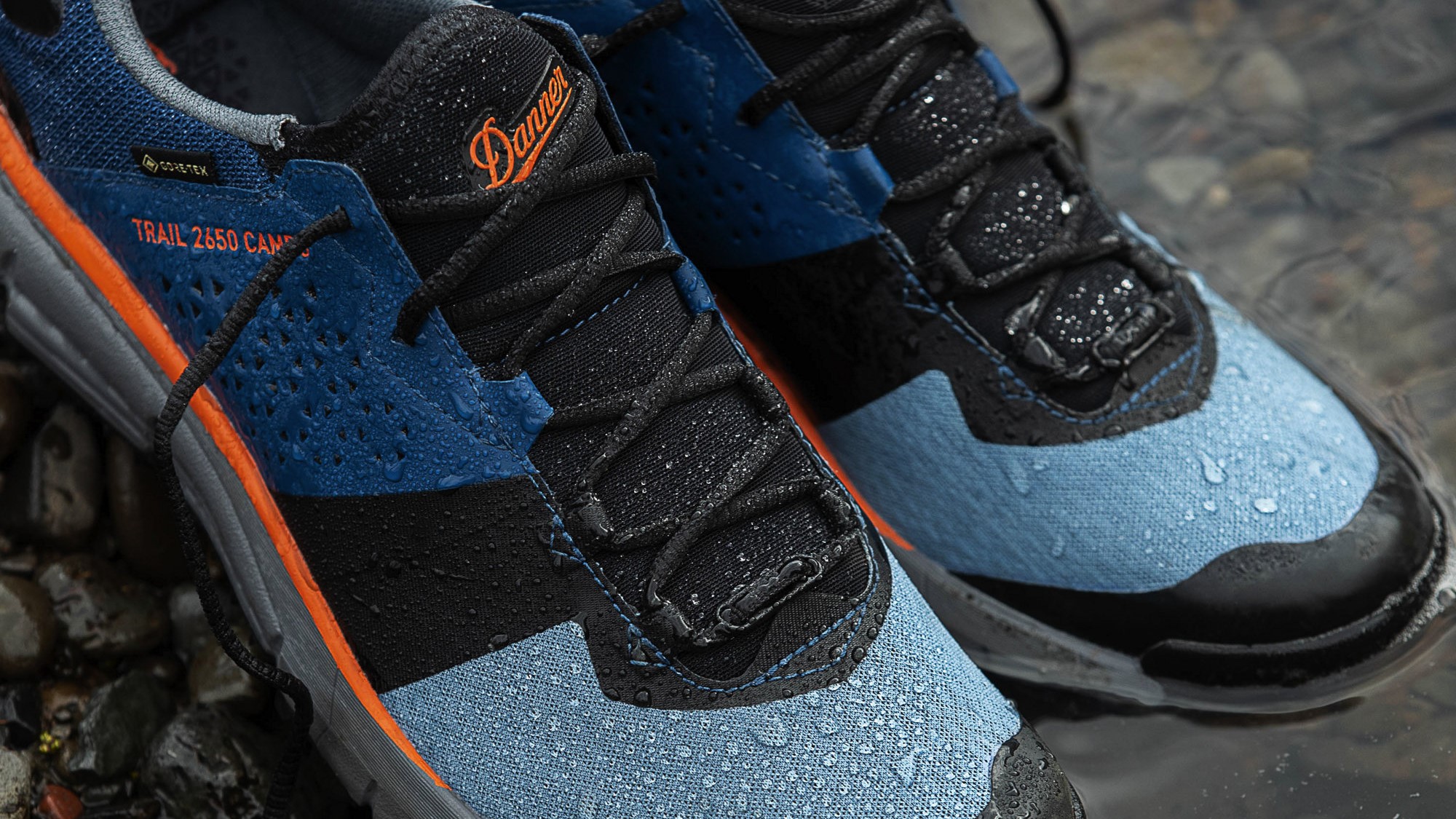
Specifications
Reasons to buy
Reasons to avoid
First impressions of the Danner Trail 2650 GTX hiking shoes are good - it seems to offer the sturdiness and protection hikers crave in a lightweight and comfortable format.
They are relatively unusual in that the sock-like, stretchy construction means you have to pull them on rather than loosening laces. Our tester Julia Clarke struggled a little, but once on found them "probably the most comfortable hiking shoes I’ve ever worn".
They have a snug, comfortable fit, plenty of flex and three layers of removable cushioning that's breathable. You use the heel tab to pull them on and the laces to secure your foot in place.
In the field they turned out to be robust and even exceled in wet weather over rocky terrain.
The durable uppers made from leather resist abrasion and the Gore-Tex membrane helps keep out water in even heavy downpours. On warmer weather hikes your feet can still breathe.
Despite the light weight, these hikers hold up on long missions and give plenty of stability on rough trails. They do have a high price, but they are built to last.
Read our full Danner Trail 2650 Campo GTX review
The best value hiking shoes
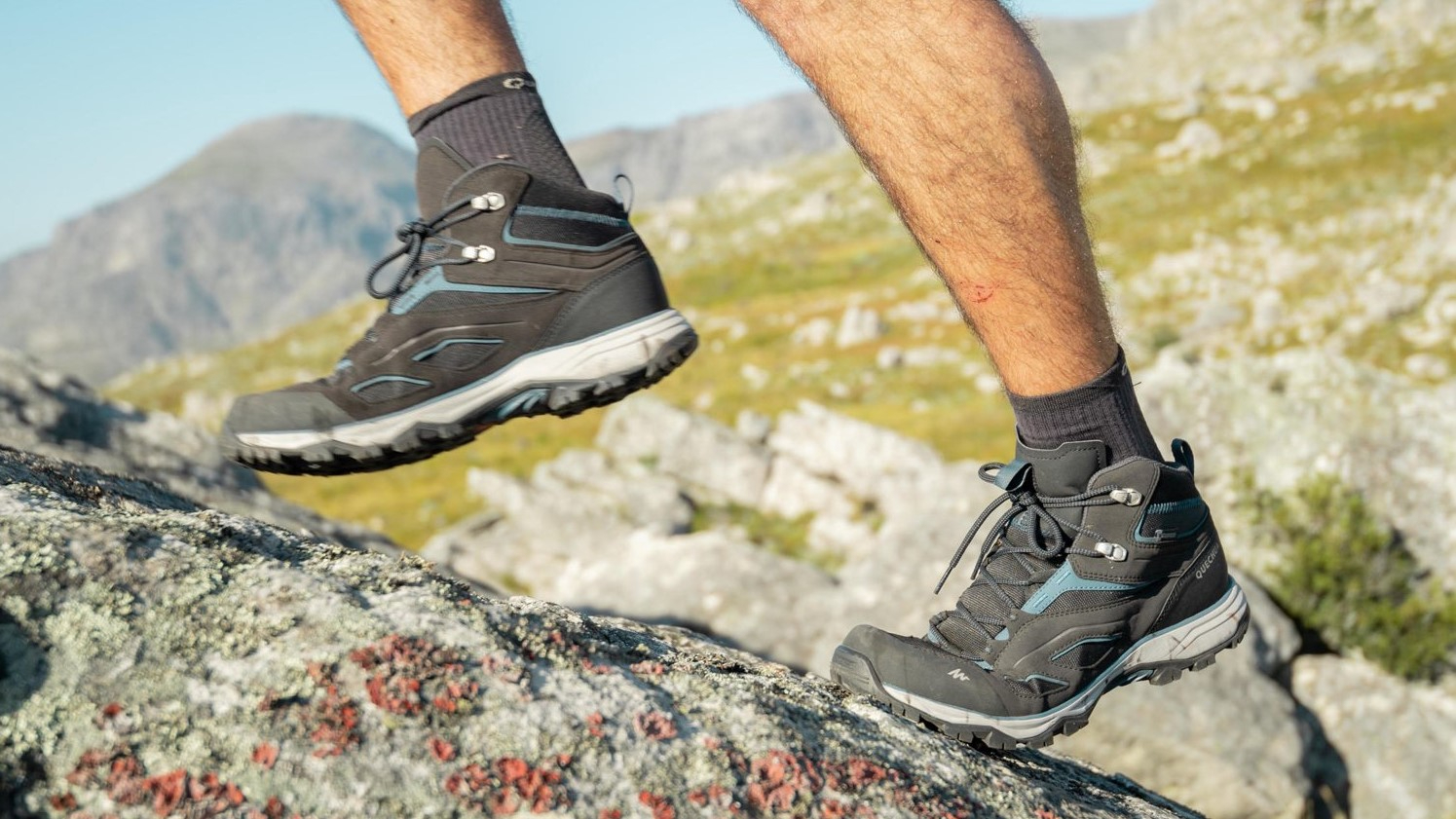
14. Decathlon Quechua Waterproof MH100
Our expert review:
Specifications
Reasons to buy
Reasons to avoid
The look of this shoe is rather retro, which you will either love… or not.
Decathlon reports that the MH100 waterproof shoe was “designed at the foot of Mont Blanc for occasional mountain hikes of three to four hours’ duration and up to 700 meters.” They are very specific about this, and it is useful information – setting the boundaries of what this shoe’s comfort zone is which, having tested them in the hills and mountains, we largely agree with.
The sole of the MH100s is semi-flexible, and the grippy outer has been created with non-slip rubber, with 5mm studs to bite into slippery terrain.
The uppers feature stone-guard protection, and beneath the leather-synthetic mix of materials, an own-brand waterproof and breathable membrane lining keeps out water.
The shoe has full-length foot cushioning, thanks to an EVA midsole, and well-cushioned heel and tongue areas. If anything, the in-sole cushioning could be a little too much for some people. (If there is too much give in a sole it can zap your energy and making the process of walking less responsive.)
Meet the expert
You can trust Advnture
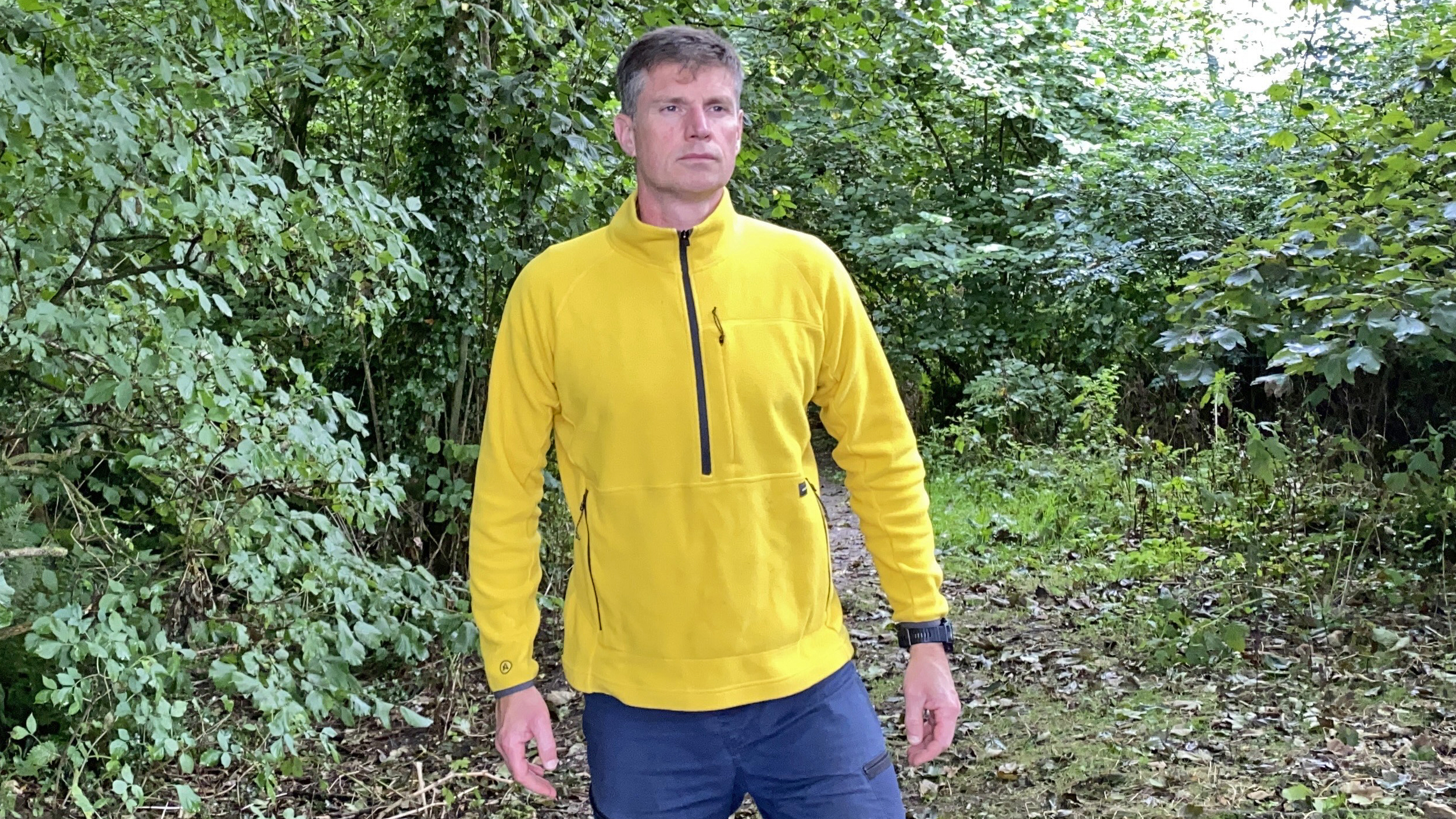
Author of Caving, Canyoning, Coasteering…, Pat has spent 20 years pursuing stories involving boots, bikes, boats, beers and bruises. En route he’s canoed Canada’s Yukon River, climbed Mont Blanc and Kilimanjaro, skied and mountain biked through the Norwegian Alps, run an ultra across the roof of Mauritius, and set short-lived records for trail-running Australia’s highest peaks and New Zealand’s Great Walks. Follow Pat’s escapades on Strava here and instagram here.
FAQs
Find answers to some of the most common questions our experts get asked when it comes to buying hiking shoes.
When should I wear a hiking shoe rather than a hiking boot?
Walking shoes are best suited to fairer conditions in general as the lighter weight models made of fabric are particularly vulnerable to bad weather.
However, some of the best hiking shoes come with excellent waterproofing. They are ideal for mild-weather hikes where you may get a small amount of rain, or for walks that feature stream crossings.
Waterproofing is such a selling point that many manufacturers will even include it in the name of their hiking shoes, so look out for it.
If you do a lot of walking in challenging conditions, opt for a more robust shoe made with hardy materials, or a hiking boot.
Even some of the best full on hiking boots are not suitable for winter conditions, so if you're a winter walker you will need a pair of the best winter hiking boots, specifically designed with snow, ice and crampon compatibility in mind.
What terrain are hiking shoes designed for?
The terrain you're hiking on will dictate the type of shoe or boot that you choose to wear. Even the best hiking shoe in the world won’t provide the same ankle support as a boot, but some are sturdier than others, and offer more protection.
If you regularly hike on rough terrain, you might want to opt for a boot for extra ankle support. Or, you can choose a shoe with a stiff sole, grippy outsole and aggressive lugs for good grip. Look for a substantial rand and a good toe cap, too. A pair of trekking poles can help share the burden on steep terrain.
Some of the products we feature in this guide are named approach shoes, which are a hybrid of climbing and hiking shoes designed for rocky scrambles and technical approaches to climber's crags.
Increasingly, approach shoes are being designed to tackle longer distances and offer durability to rival the most fortified hiking shoe. If long days out on technical scrambling terrain sounds like your bag, then approach shoes might be the optimum choice.
In summer, when watery adventures like canyoning and coasteering are on the cards, the best option is a pair of the best water shoes. While some water shoes are designed purely with aquatic antics in mind, some hybrid pairs are wonderfully amphibious, performing just as well on the trails as in the water.
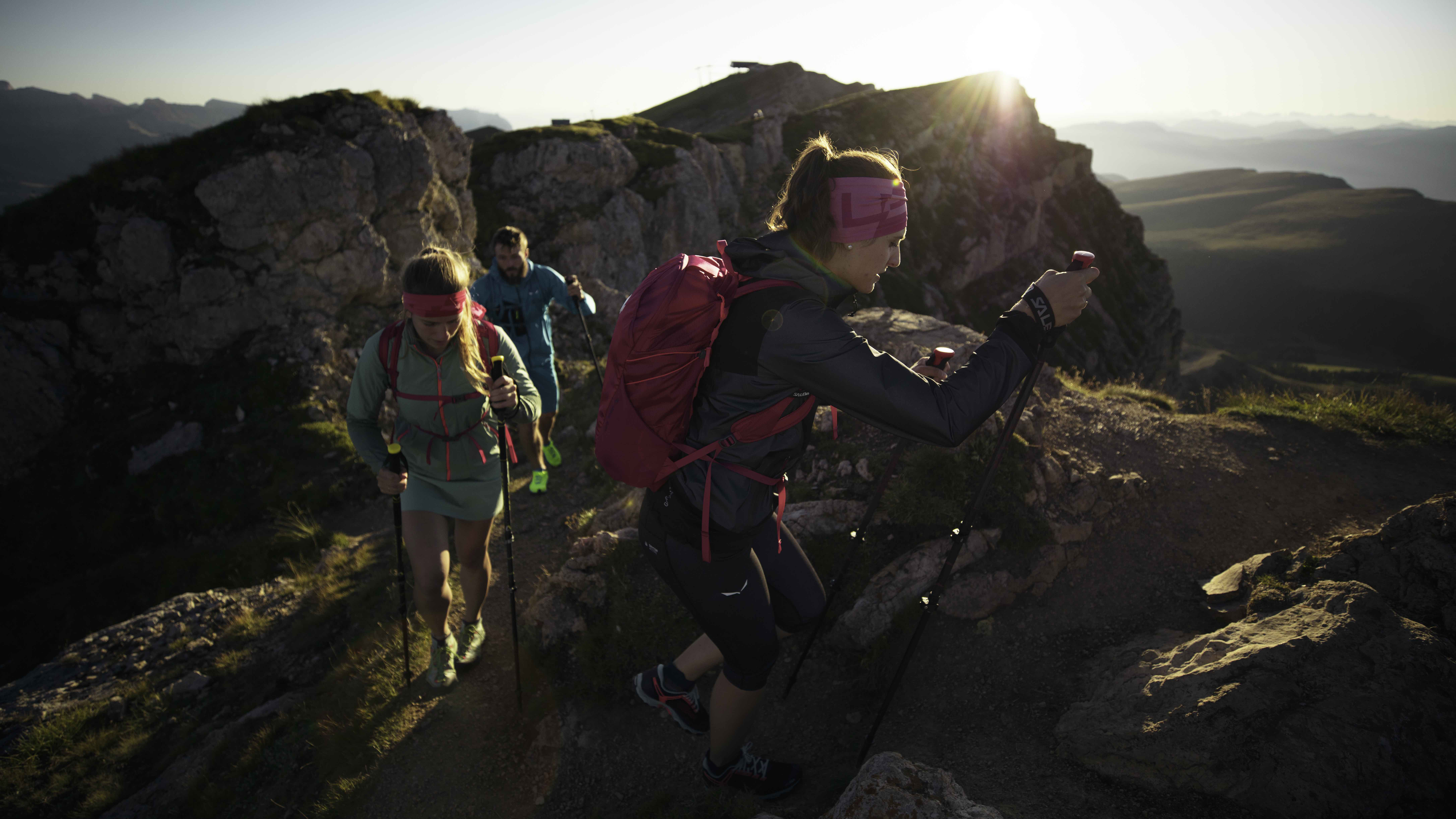
Are hiking shoes good to wear for all lengths of hikes?
Some people love to hike in shoes because they find them more comfortable. Therefore they seem like a natural choice for long-mileage treks. However, hiking boots typically offer greater ankle support, which can be beneficial for when your legs get tired and you're at greater risk from twists and sprains.
Equally, if you're carrying a heavy pack boots will help support the weight.
How to choose hiking shoes
What are the best hiking shoes for you? Here are important considerations you should factor in to your decision-making process before buying.
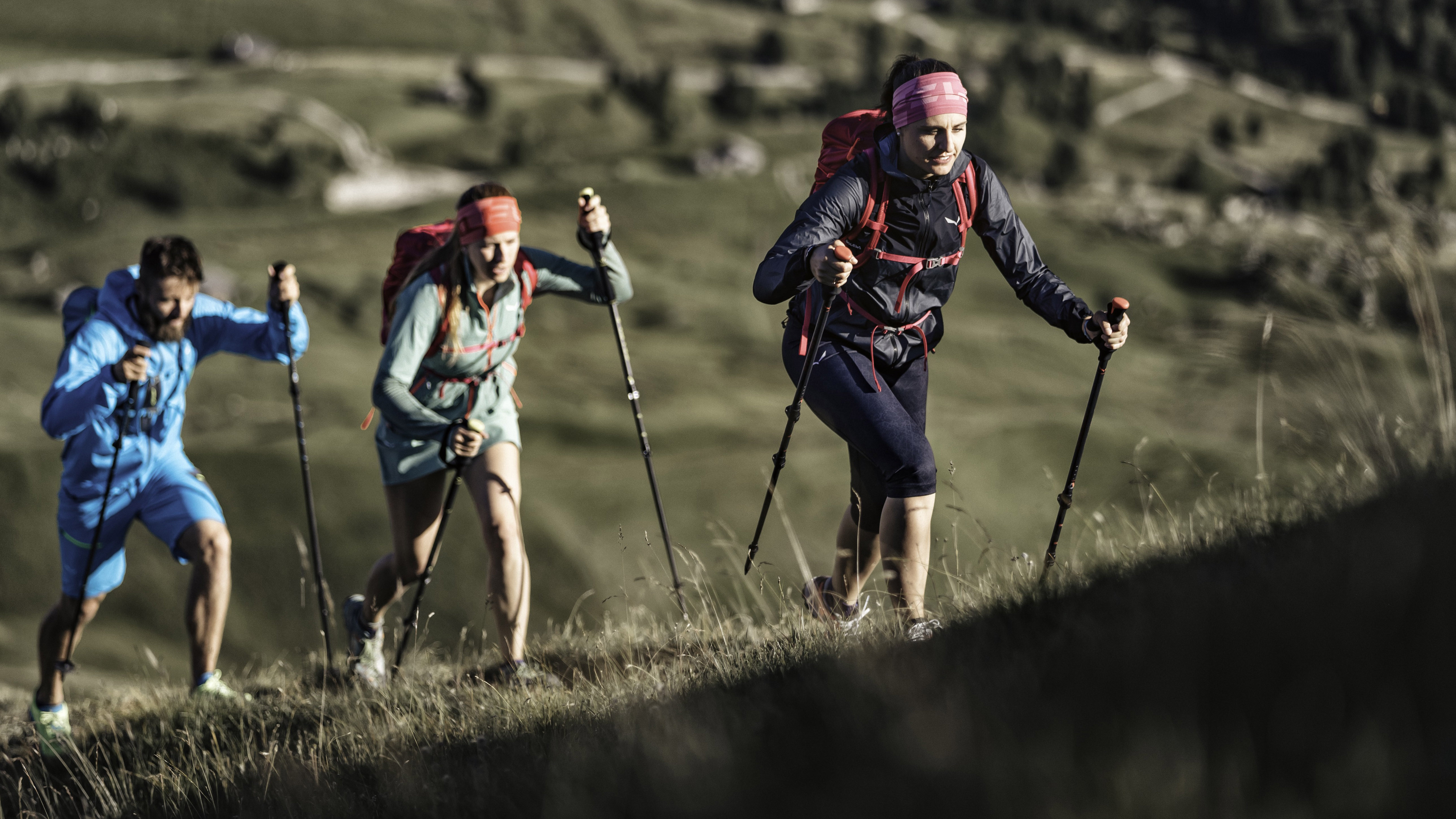
Cushioning
A stiff sole will offer great energy output, while a cushioned sole and in-sole will generally absorb energy. It depends on what you are looking for personally, though, because high cushioning protects joints and gives a more comfortable on-the-ground feel, while a stiffer and less cushioned sole offers greater stability and traction, as well as less energy absorption. Try out contrasting pairs to get a feel for this and don't forget to wear your best hiking socks when you do.
Some runners and hikers prefer to be able to feel the trail beneath their feet – this is known as 'trail feel' or 'ground feel'. With this in mind, the best barefoot running shoes and hiking shoes are becoming increasingly popular. Of course, this means less cushioning but does allow you to connect to the landscape more intimately.
Width
We all have different shaped feet and the difference between male and female feet can be significant. The shoes in our reviews are rated for width and keep an eye out for designs specifically tailored for women.
Weight
Hiking shoes are usually lighter in weight than walking boots but heavier than a running shoe. The weight of footwear can cause fatigue over longer distances but some shoes are heavier because they have features such as stiffer soles and more robust uppers.
Heel to toe drop
Running footwear usually includes a heel-to-toe drop dimension. A neutral drop shoe, for example, will be zero and then the size increases up to 10mm and more. Few boot brands give these details out, so it is important to try them on before buying to see if the shoe suits your walking style and gait.
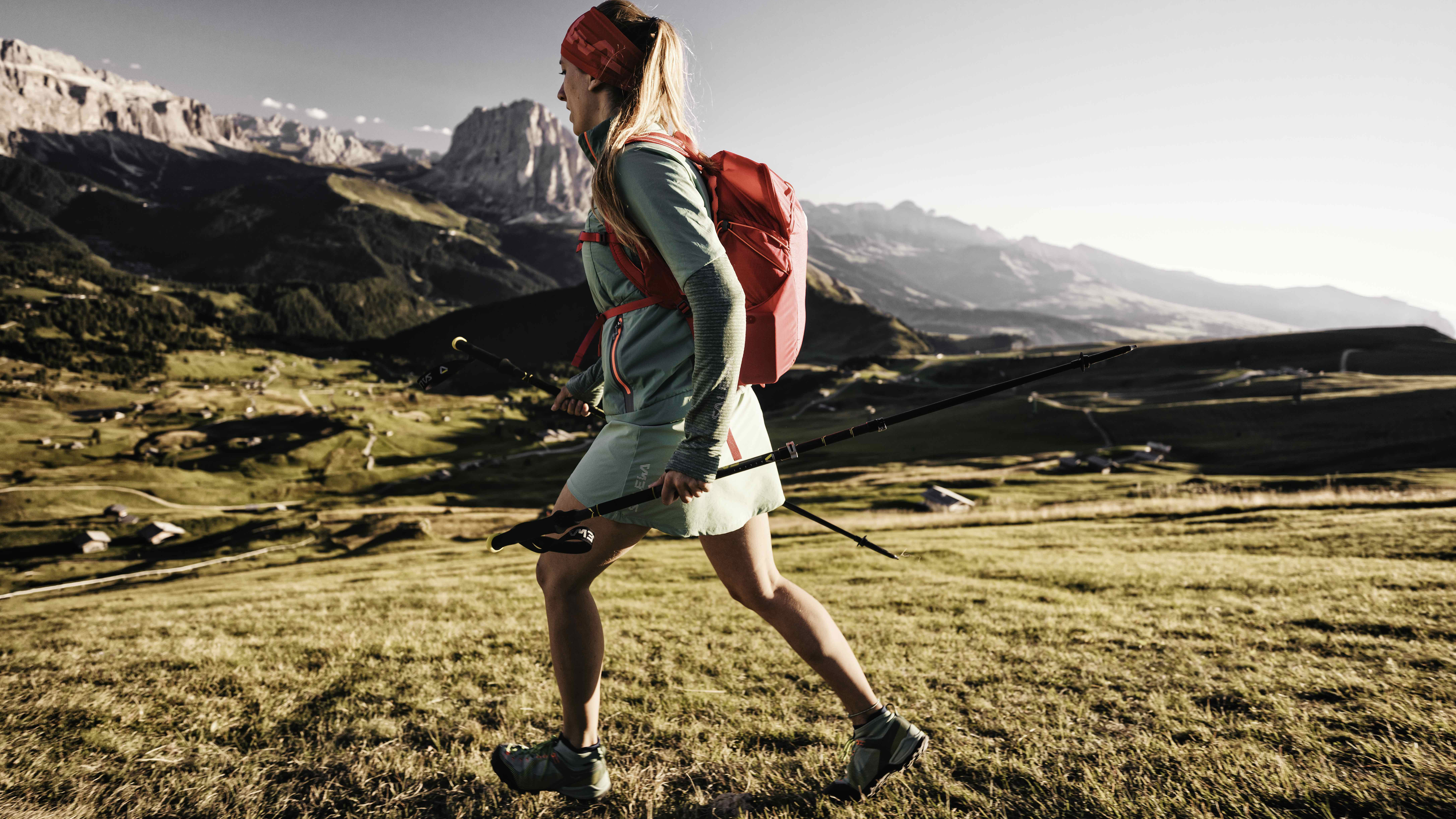
Materials
Walking shoes can be made of leather, nubuck leather, suede and synthetic fabrics, or a mix of these. Leather is likely to be harder wearing but your feet are more likely to become hot and sweaty. Fabric is more breathable, but less durable. A rubber rand around the shoe, where the upper joins the sole, can be useful for reducing abrasion from rocks, stones and vegetation. Look for shoes with extra rubber at the toe and heel, too.
Waterproofing
Many shoes are designed with a waterproof and breathable membrane lining. The aim is to make fabric waterproof and water resistant. Gore-Tex is the best known waterproof membrane brand and it is used by many of the best hiking shoe and boot brands. Other companies use their own-brand membrane, which work to a greater or lesser degree. It is useful to have a rubber rand fully around the shoe to stop water ingress from puddles and mud, but remember, once the water level exceeds ankle height, you’re going to get wet feet if you’re wearing shoes, no matter how waterproof they are.
- Best waterproof jackets: tested and rated for inclement weather
Advnture Newsletter
All the latest inspiration, tips and guides to help you plan your next Advnture!

Author of Caving, Canyoning, Coasteering…, a recently released book about all kinds of outdoor adventures around Britain, Pat has spent 20 years pursuing stories involving boots, bikes, boats, beers and bruises. En route he’s canoed Canada’s Yukon River, climbed Mont Blanc and Kilimanjaro, skied and mountain biked through the Norwegian Alps, run an ultra across the roof of Mauritius, and set short-lived records for trail-running Australia’s highest peaks and New Zealand’s Great Walks. He’s authored walking guides to Devon and Dorset, and once wrote a whole book about Toilets for Lonely Planet. Follow Pat’s escapades on Strava here and Instagram here.
